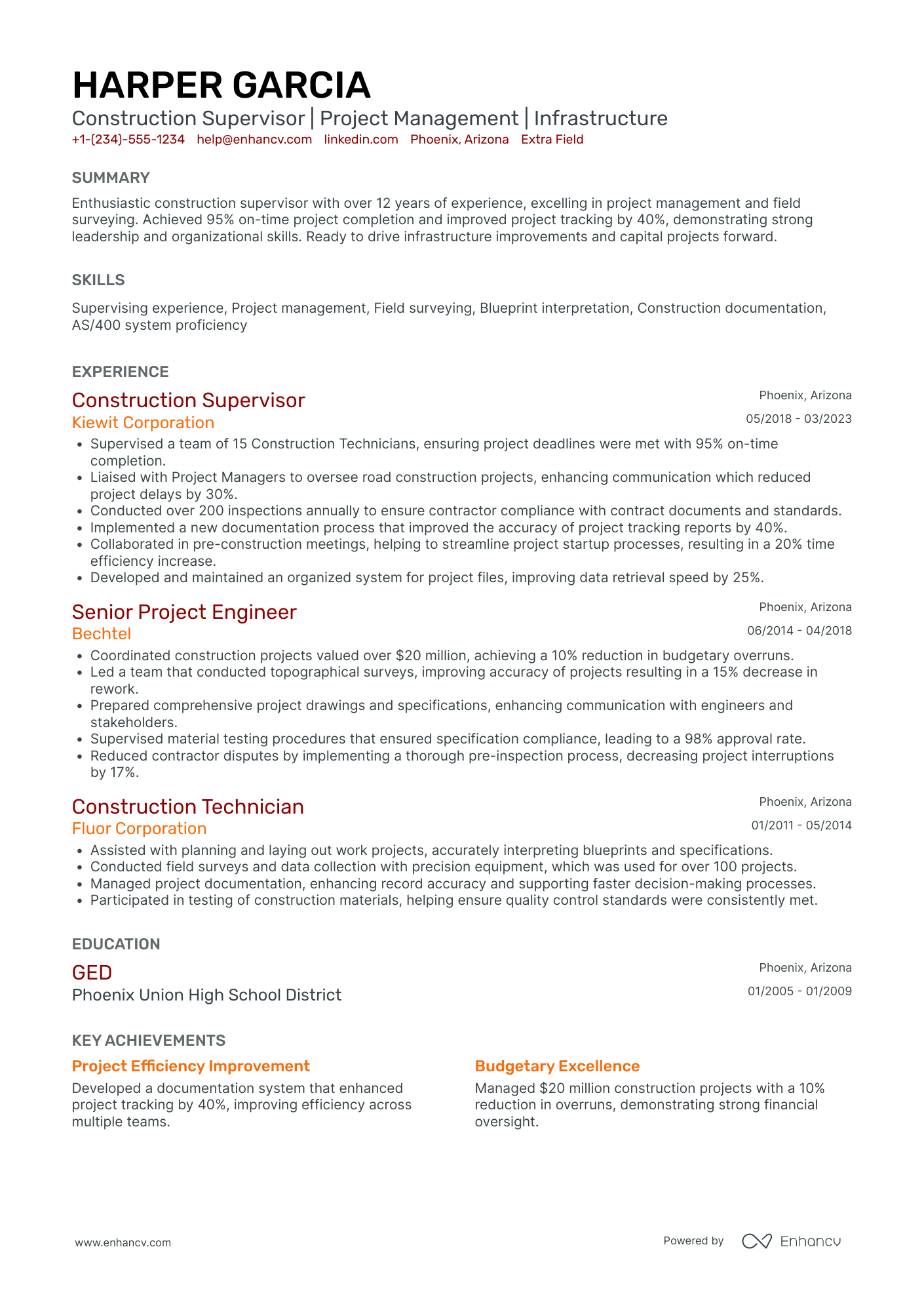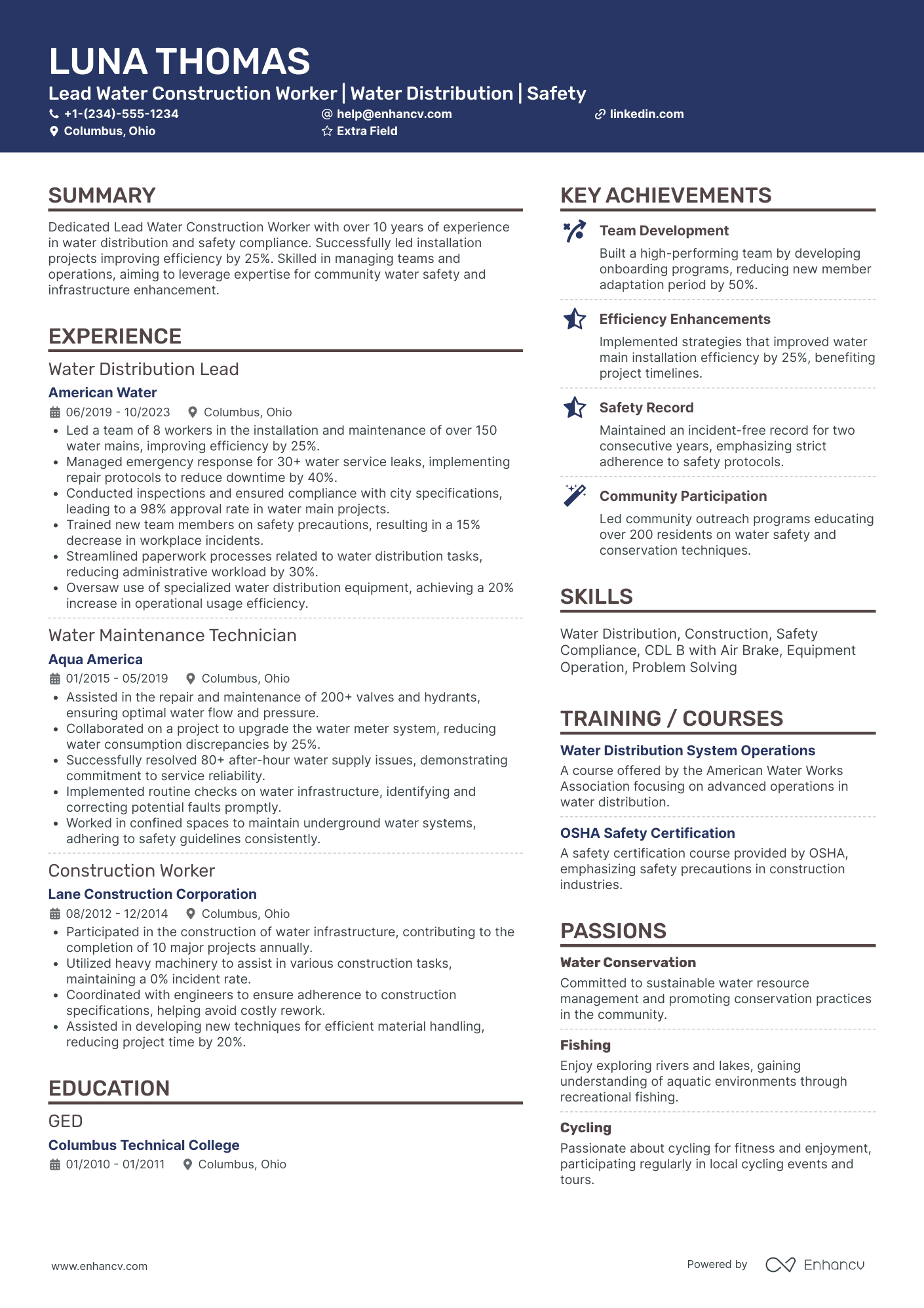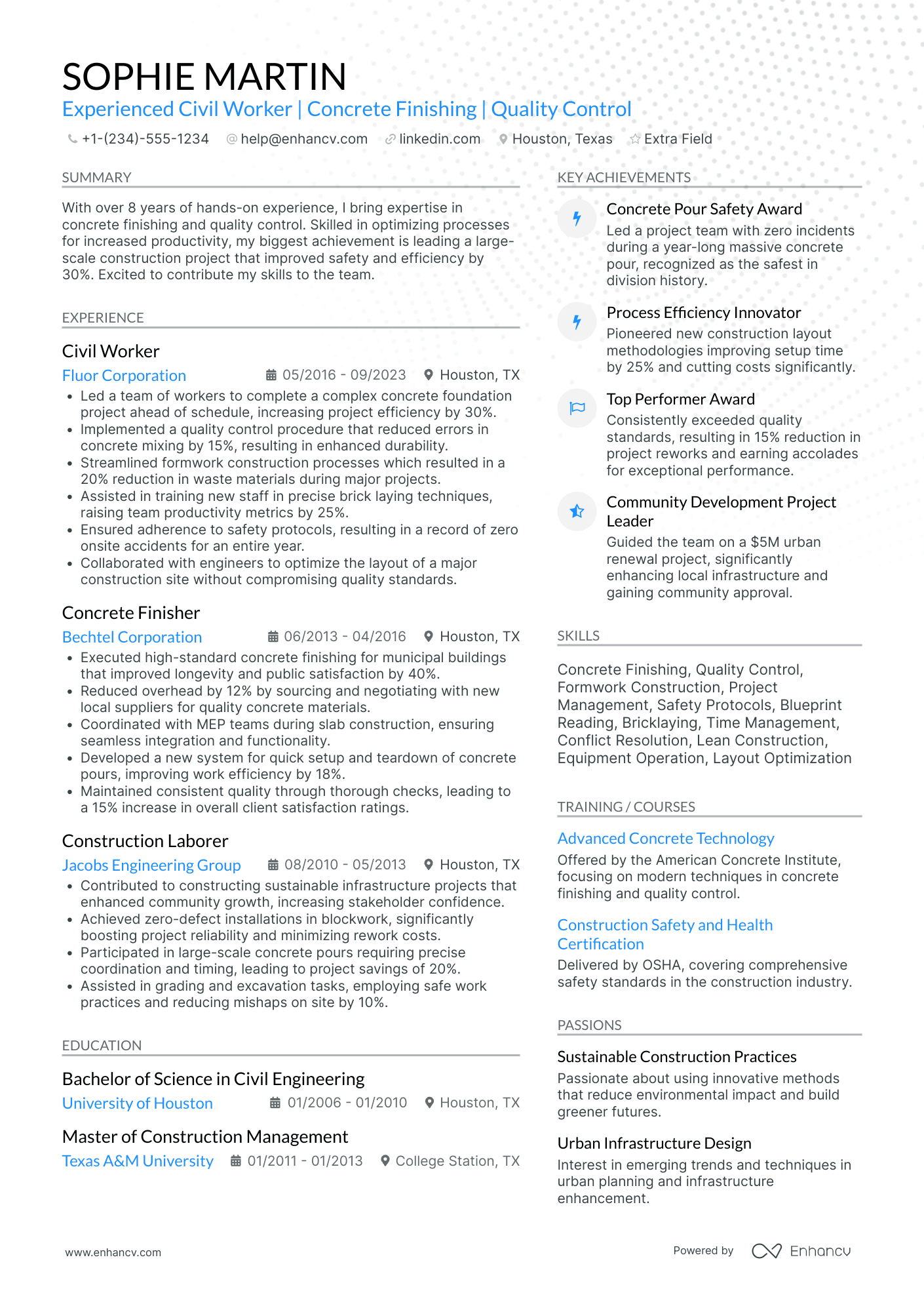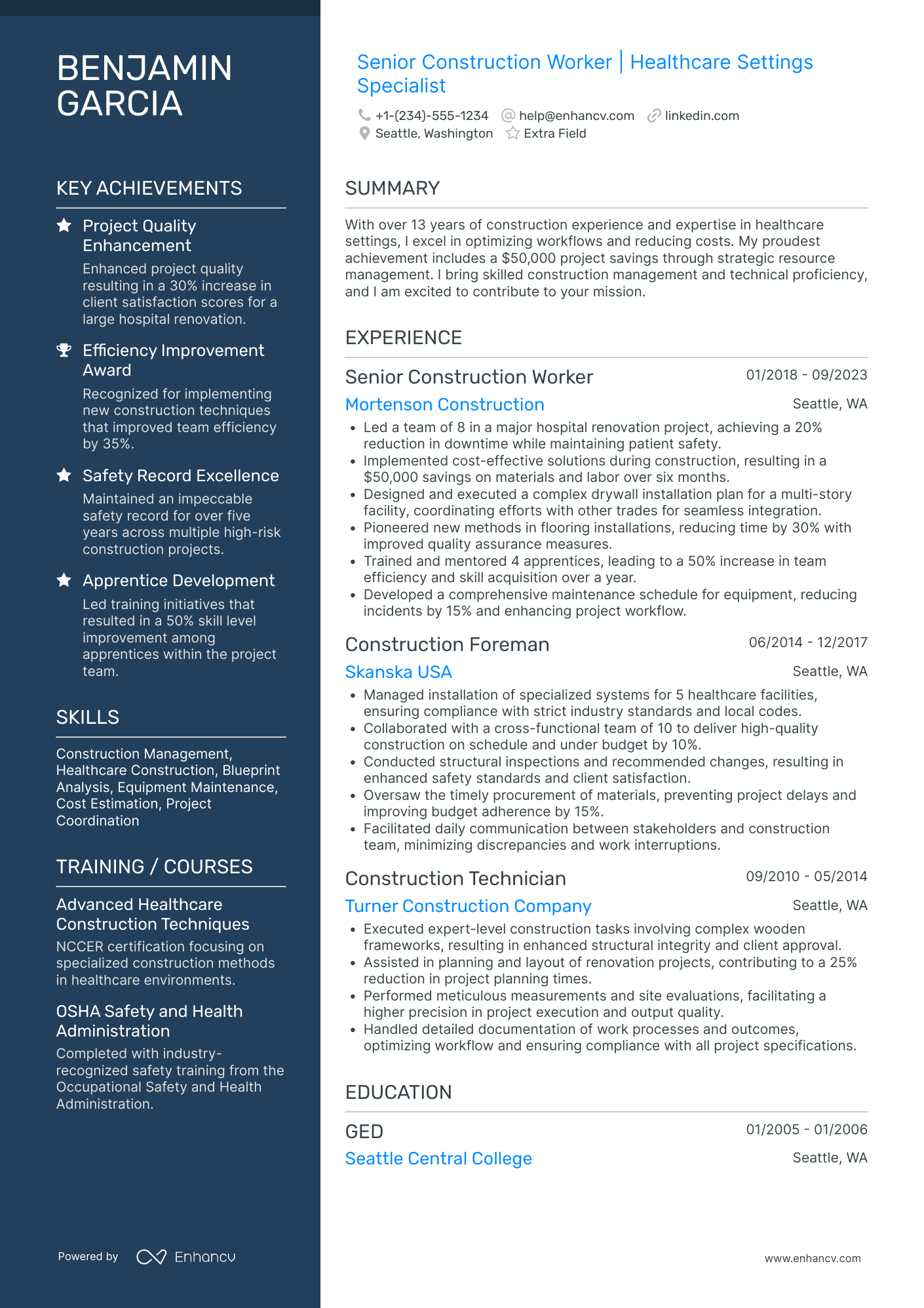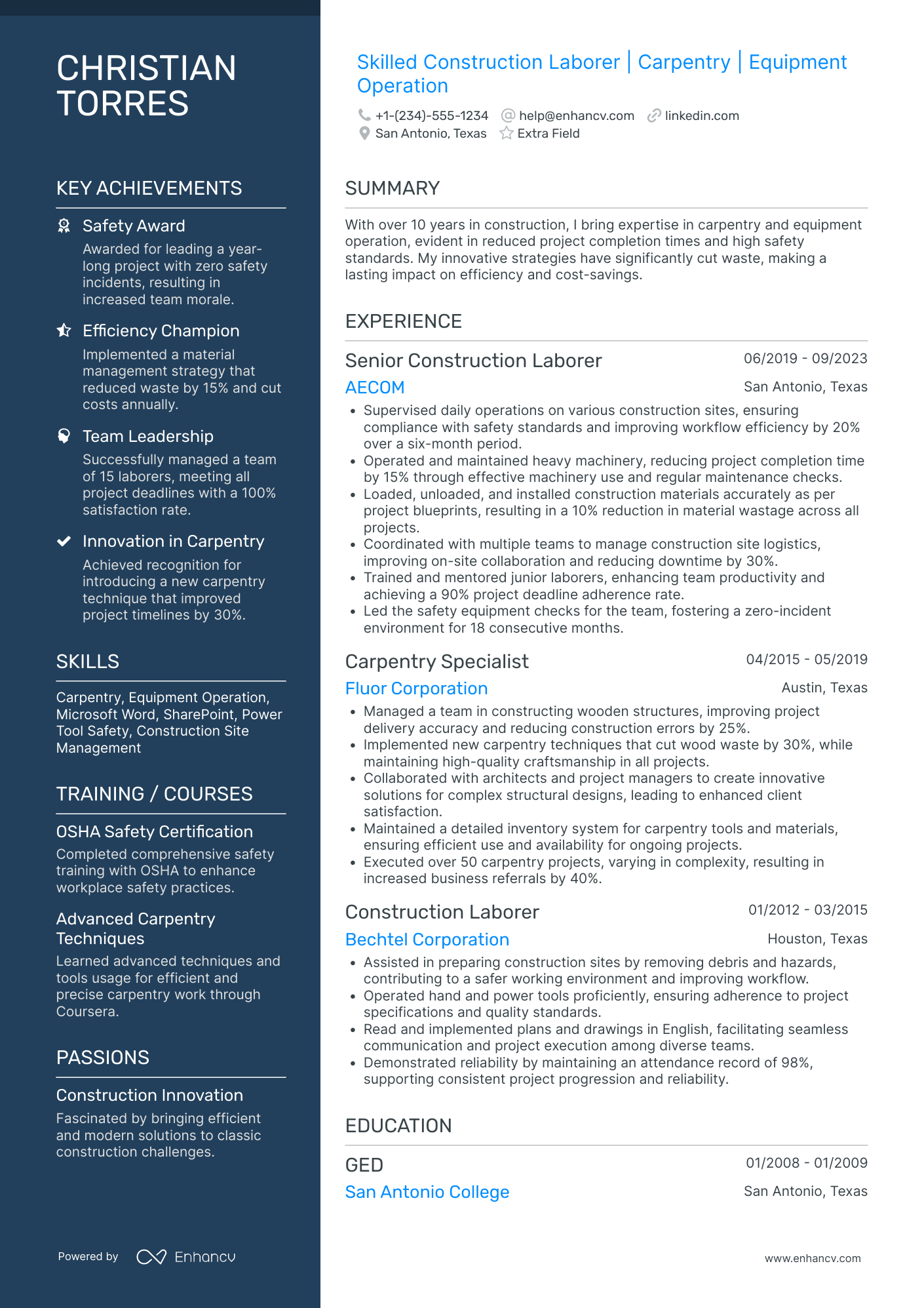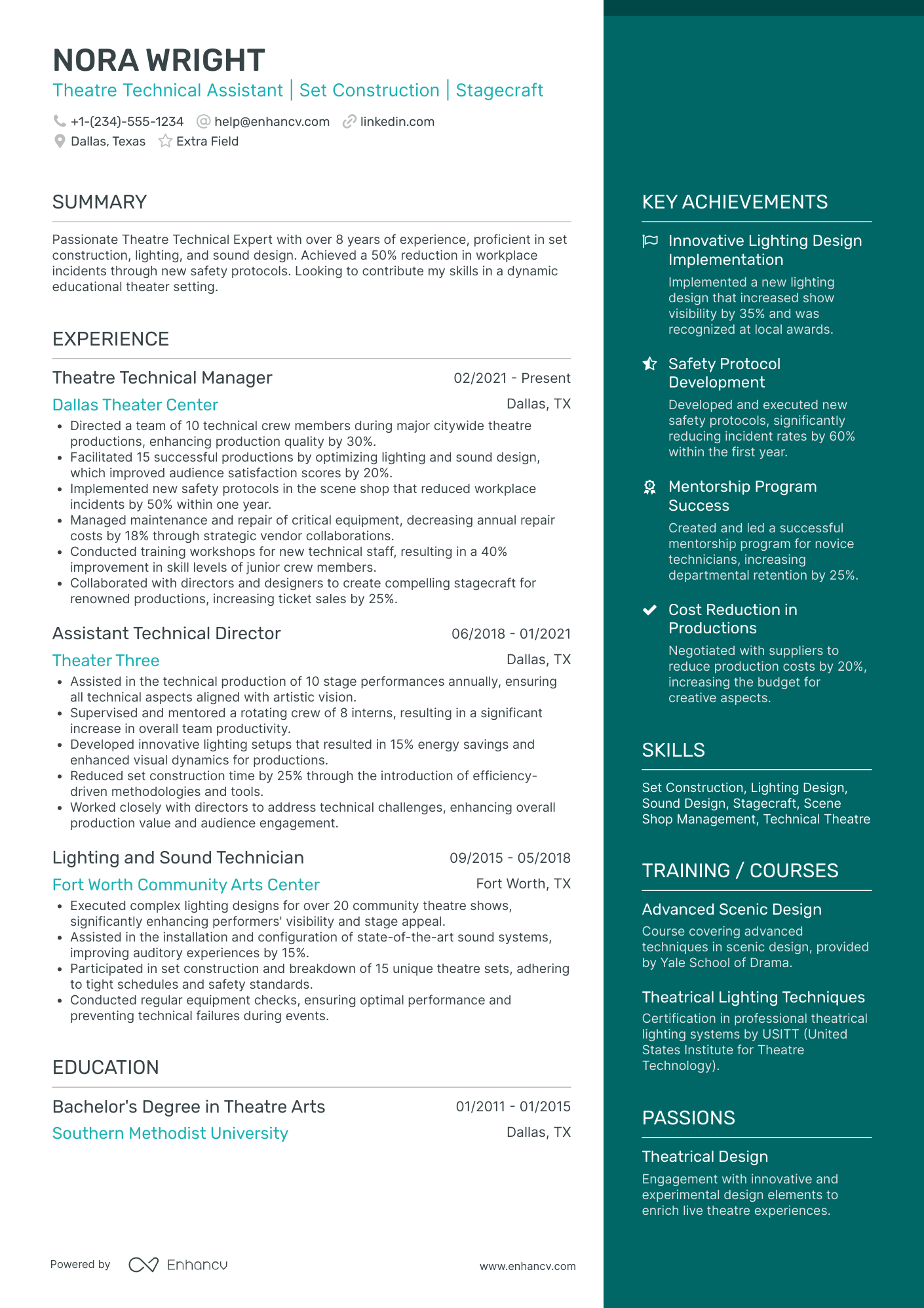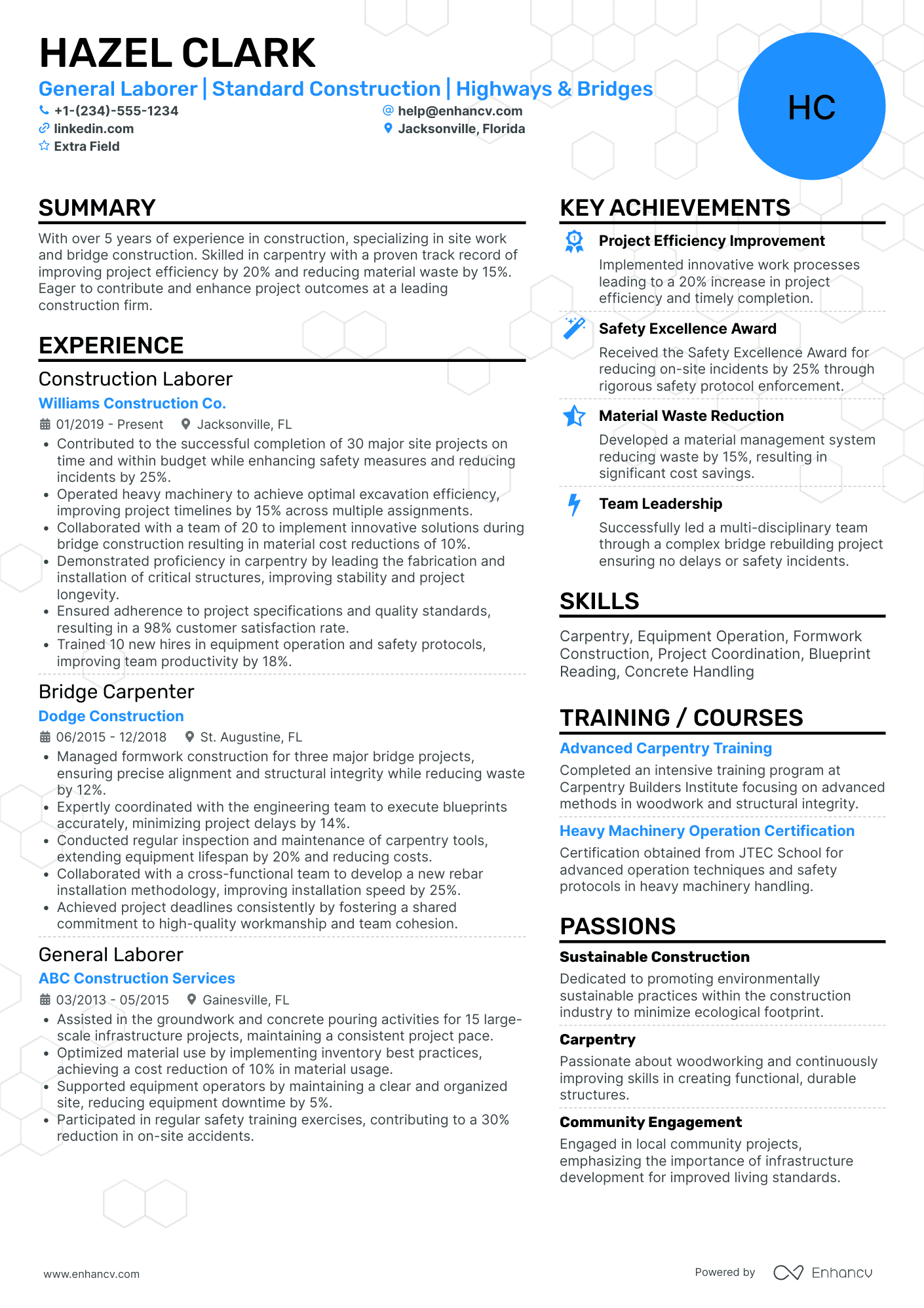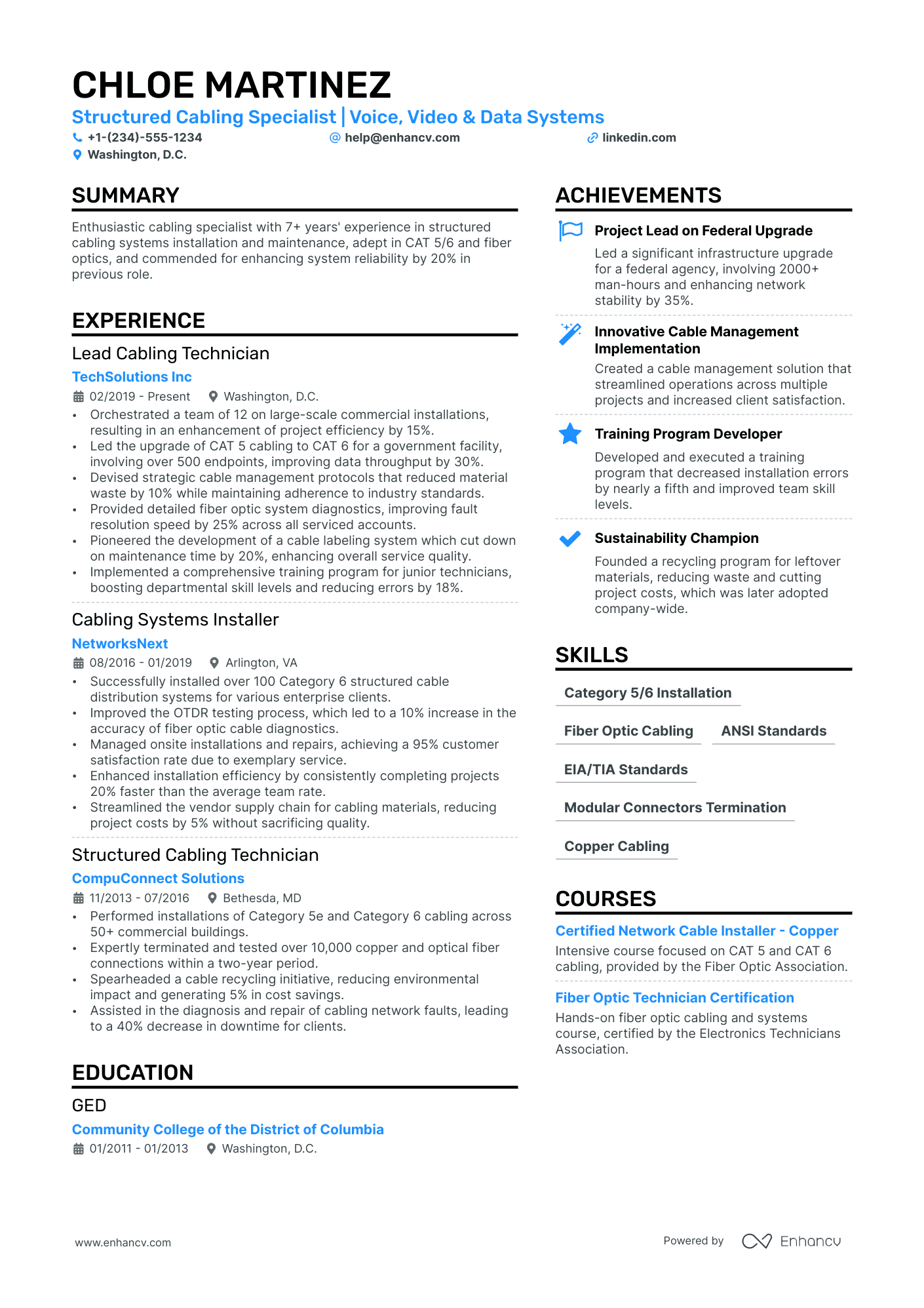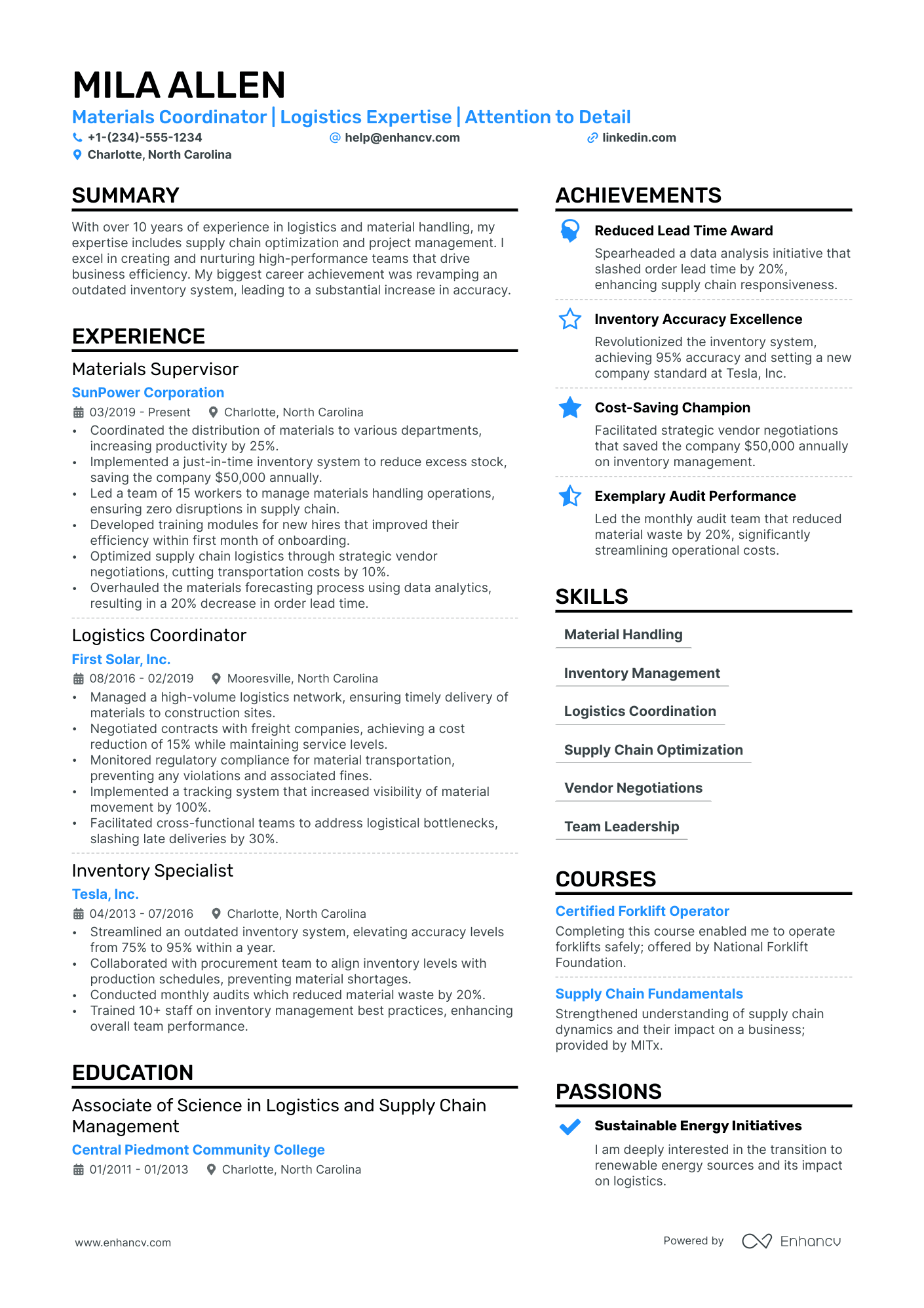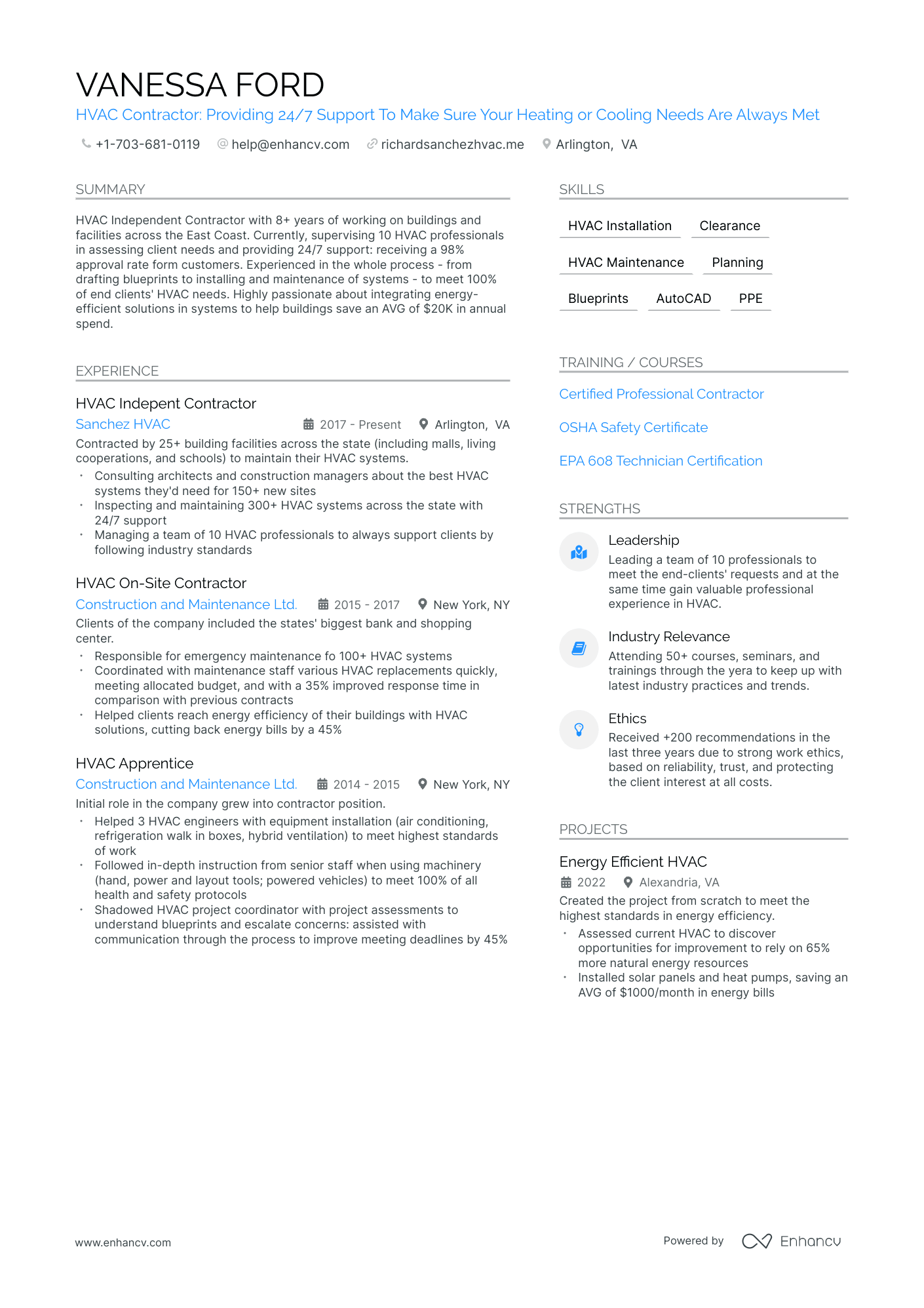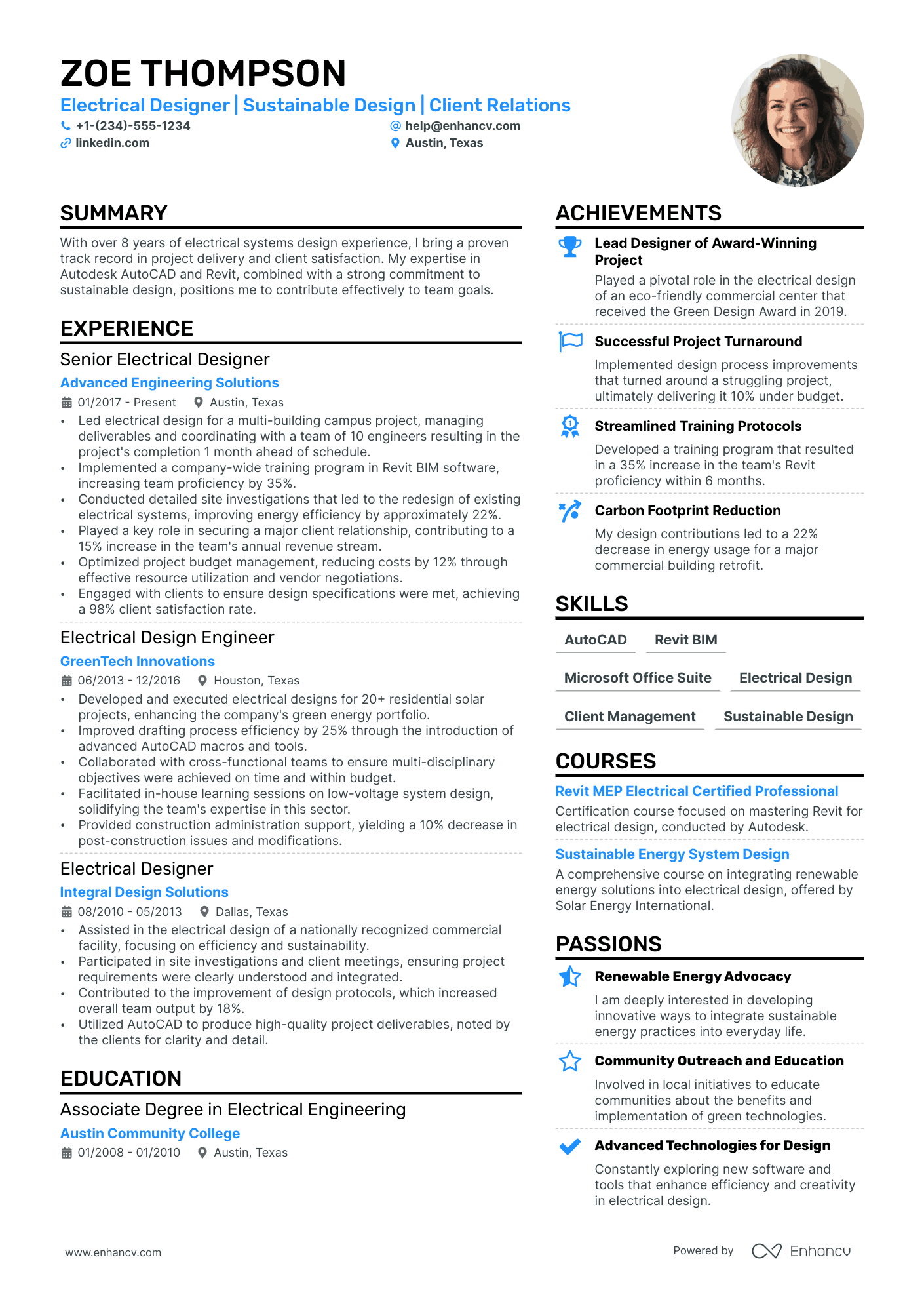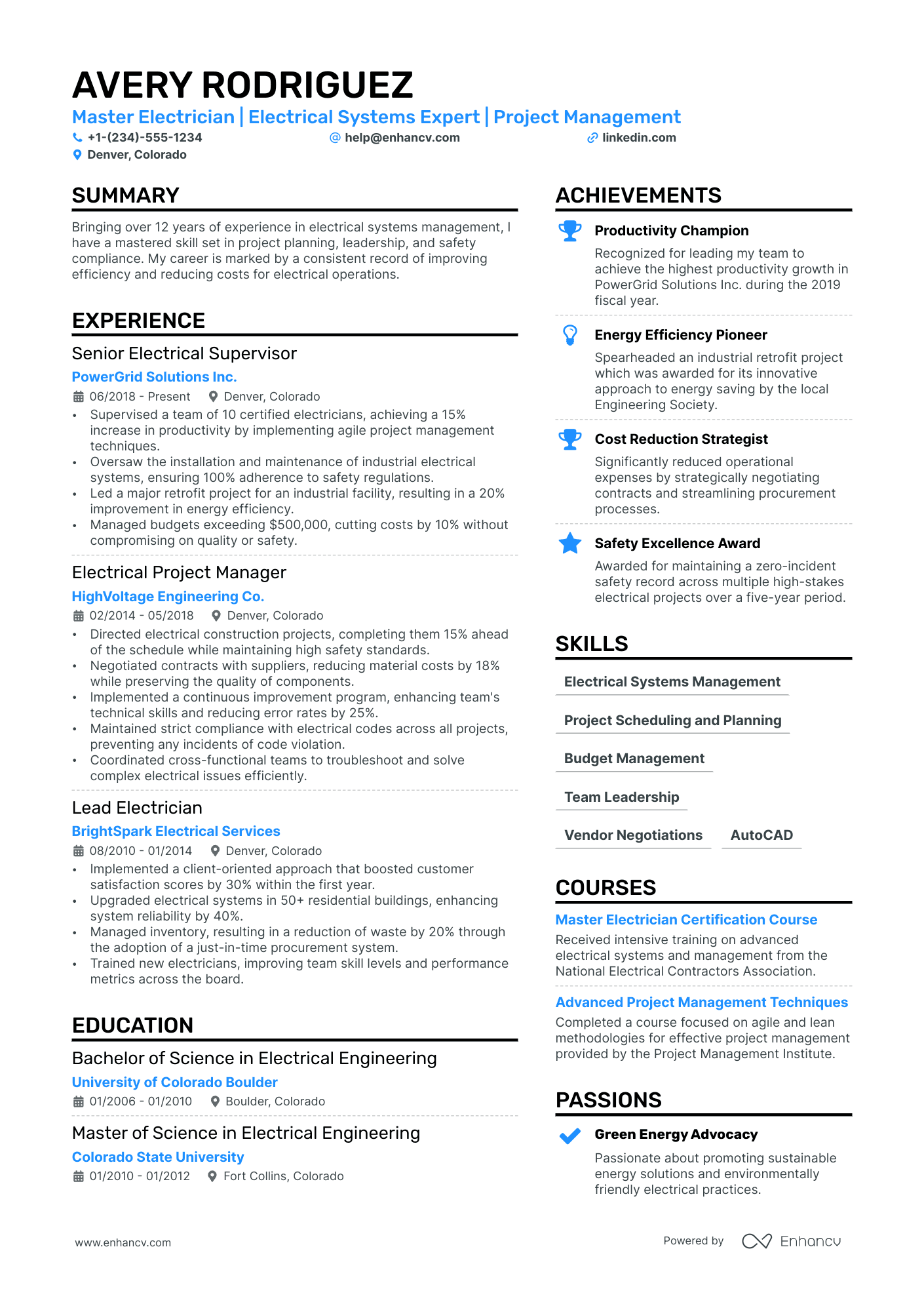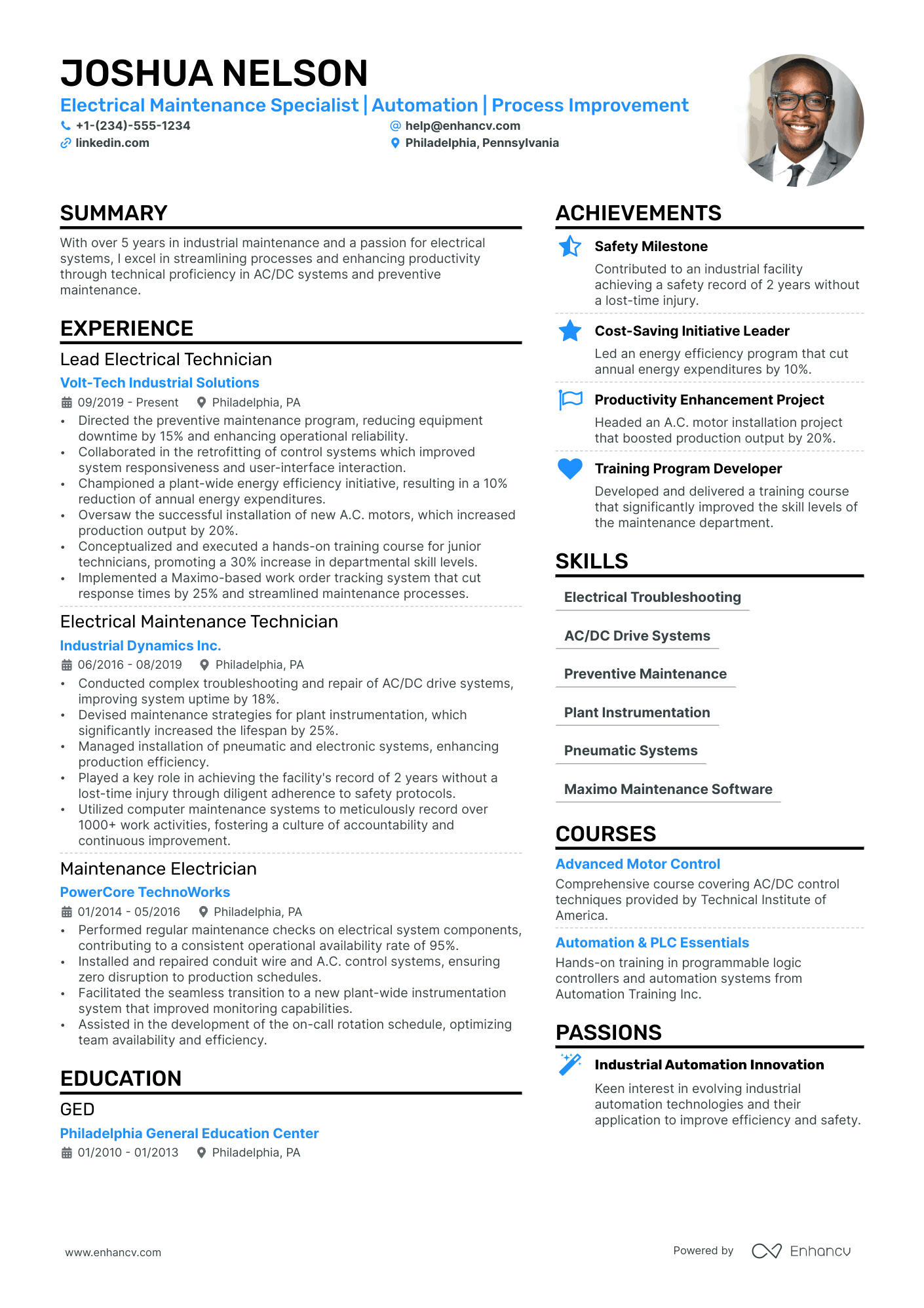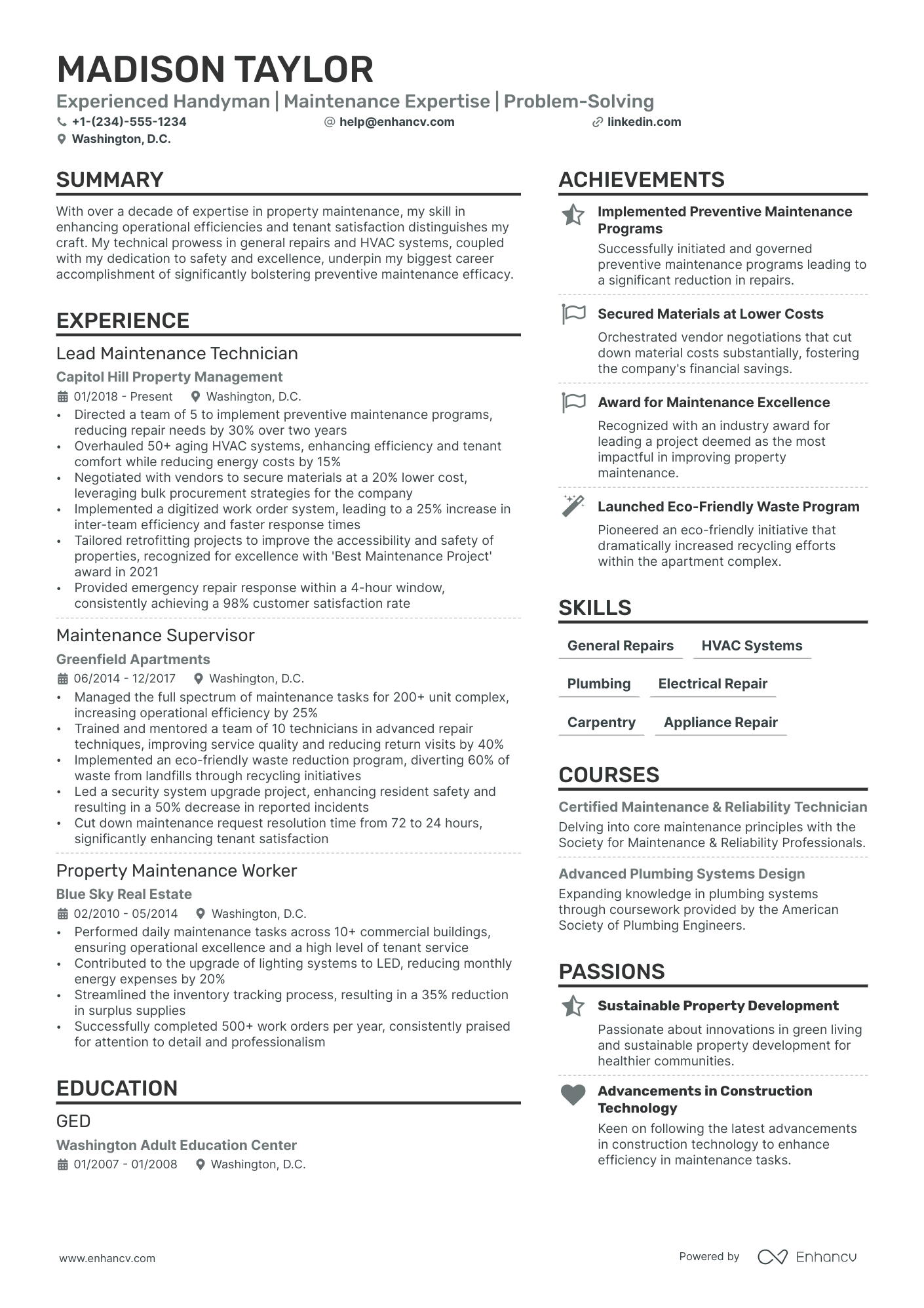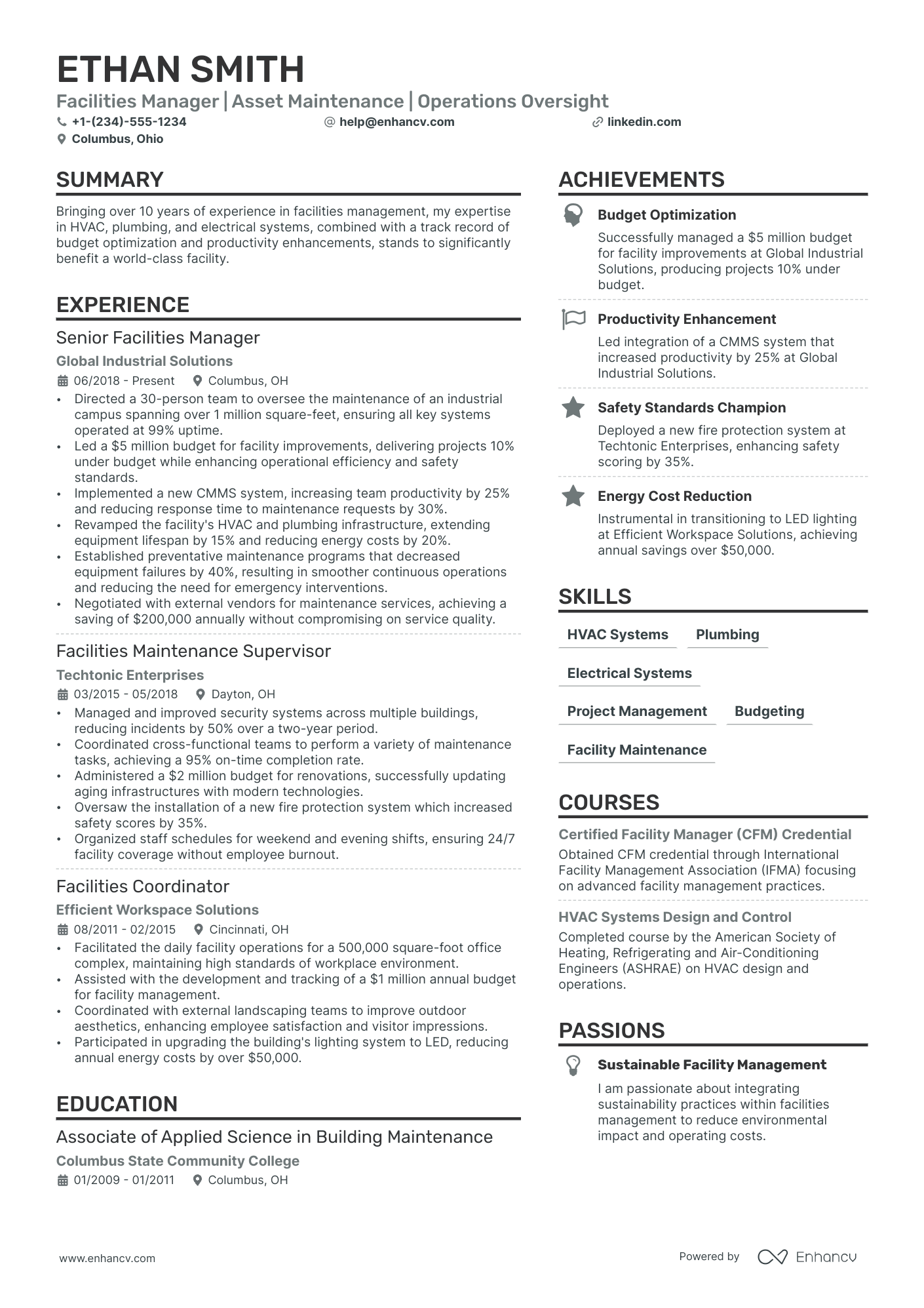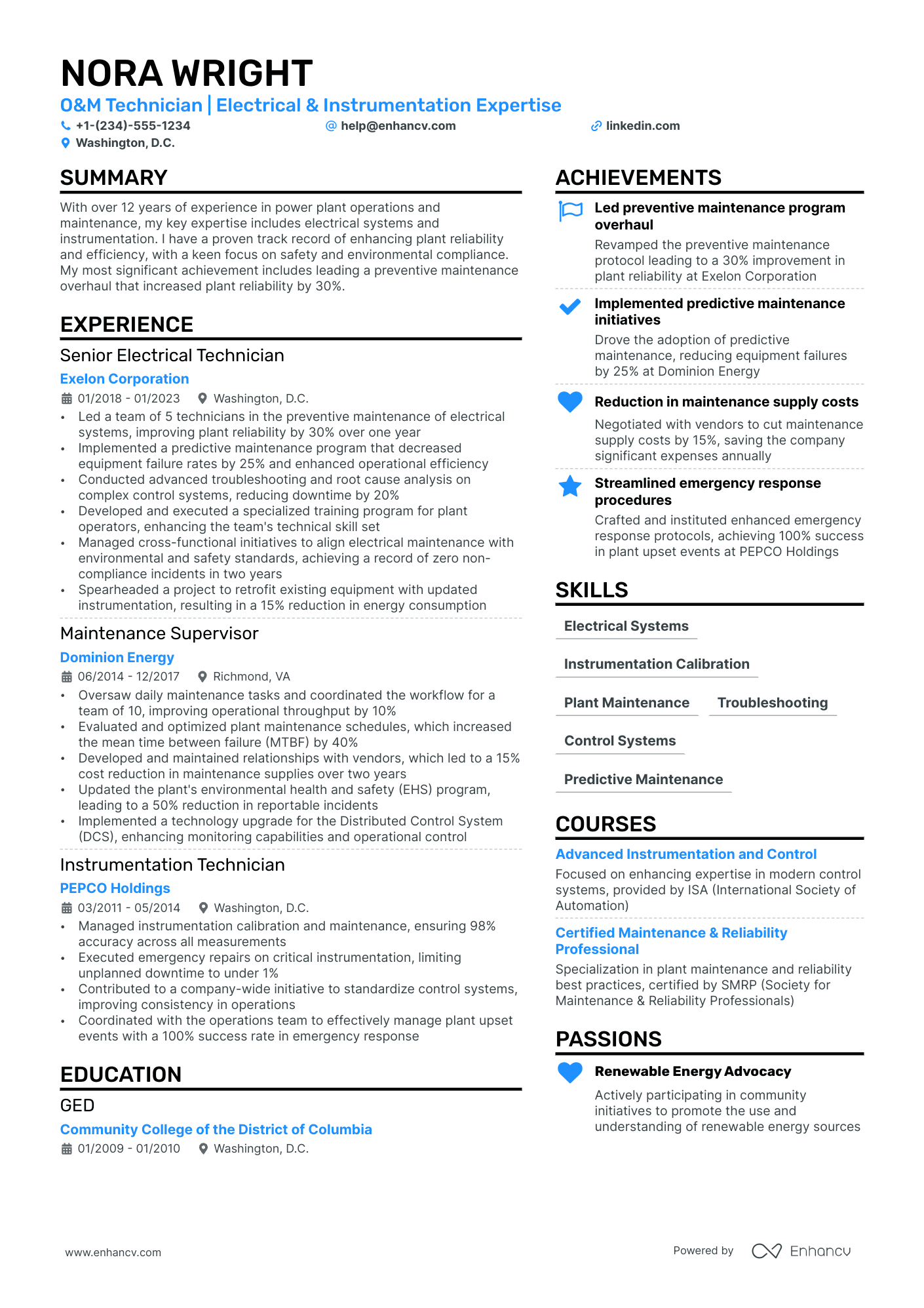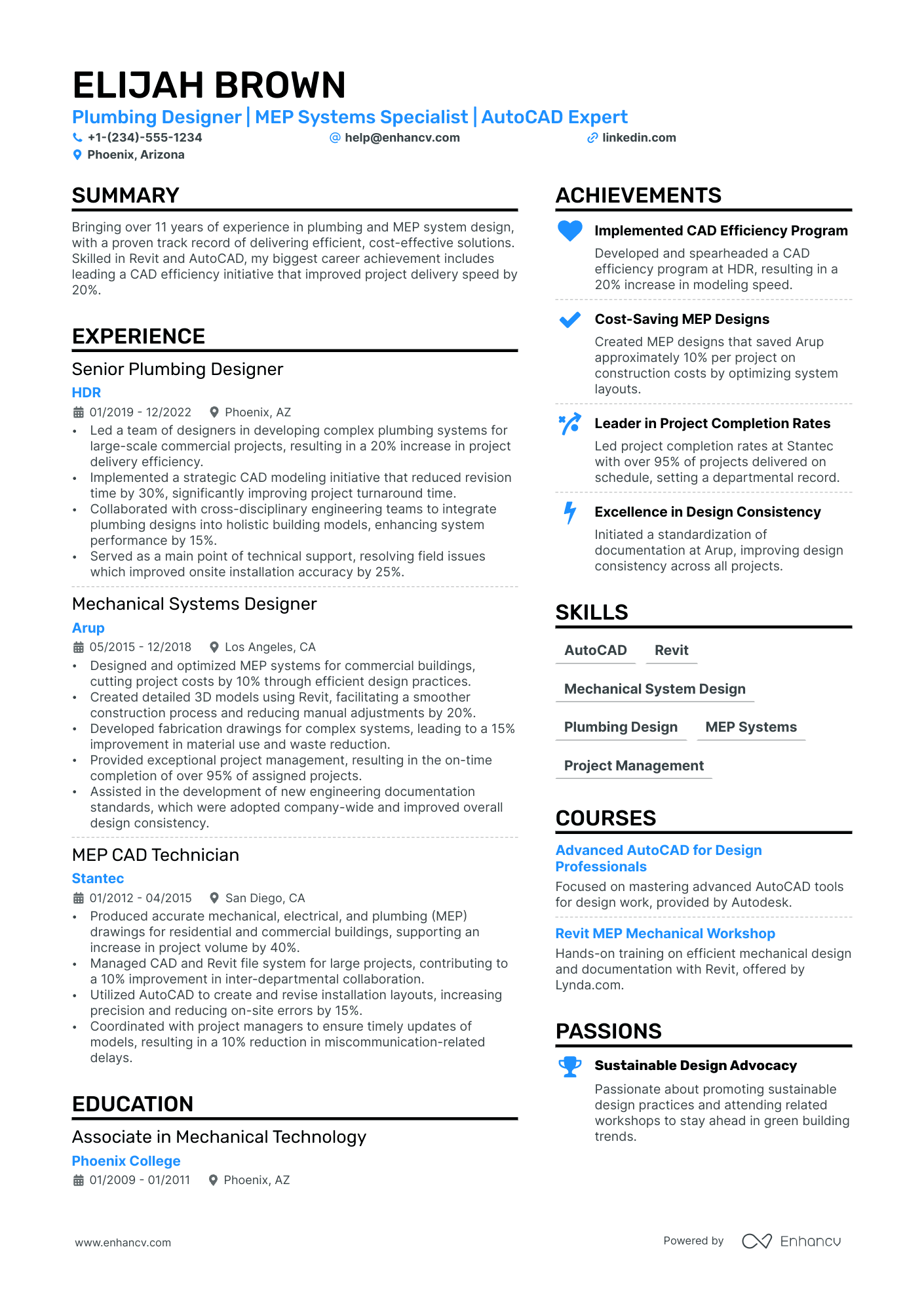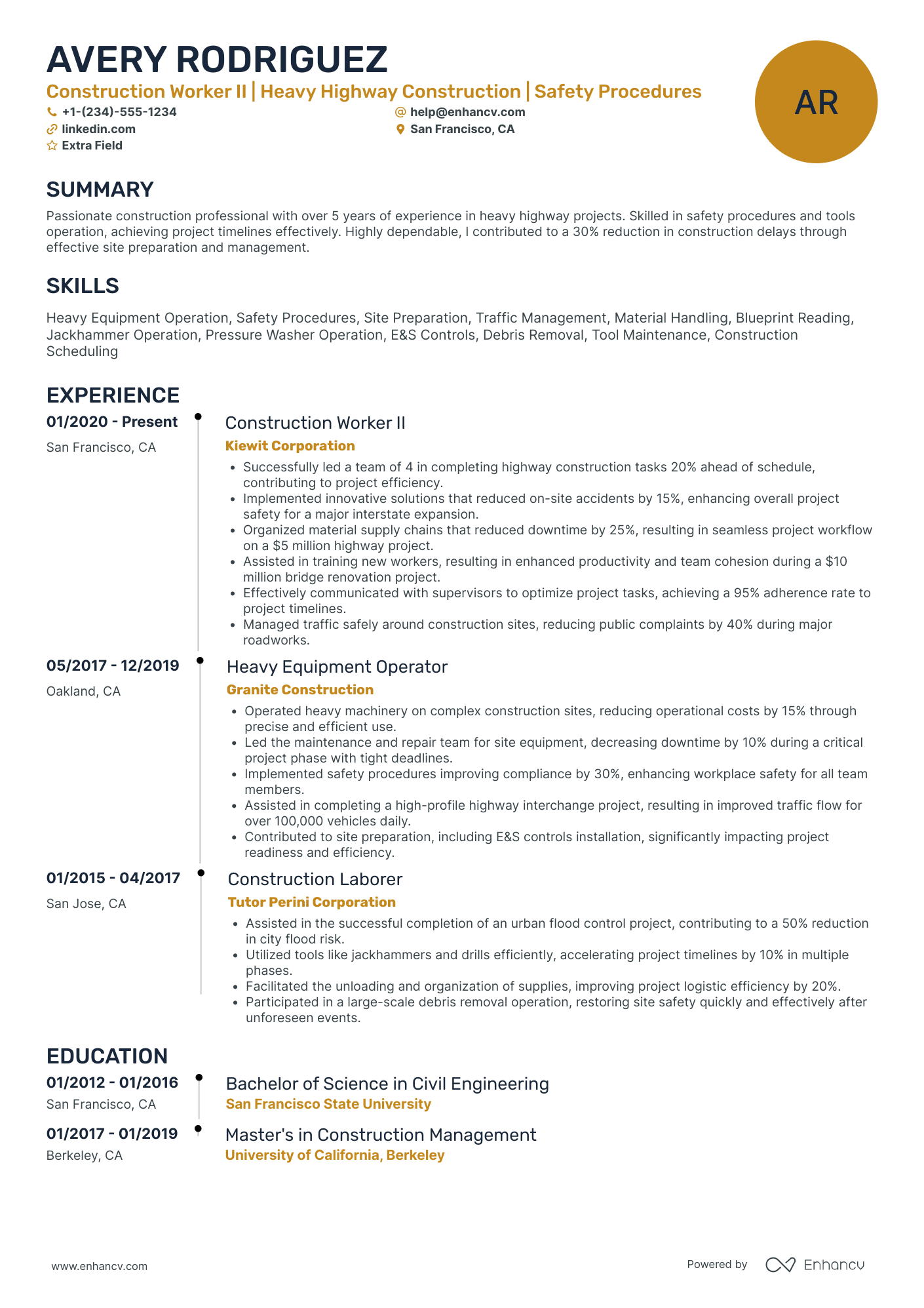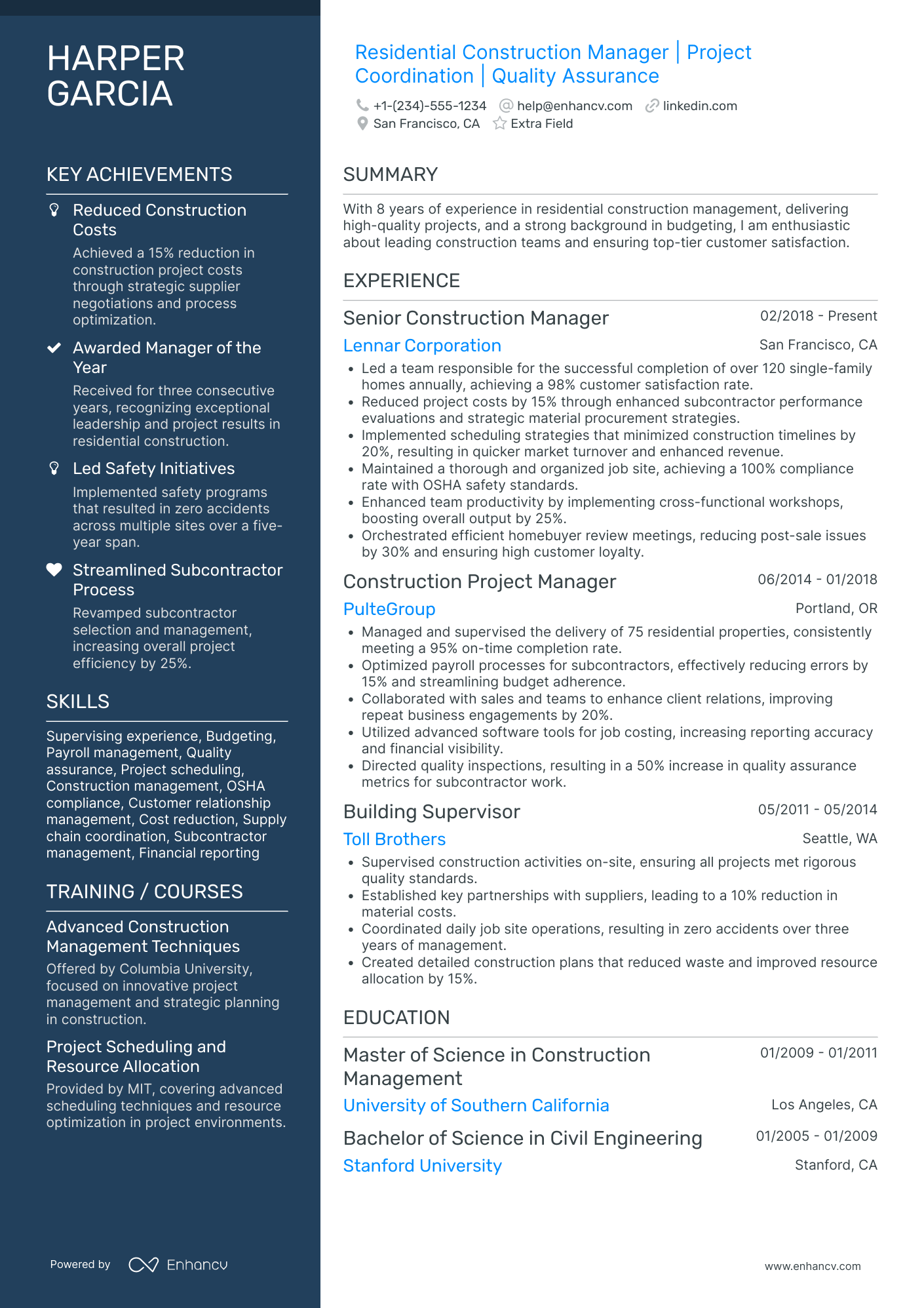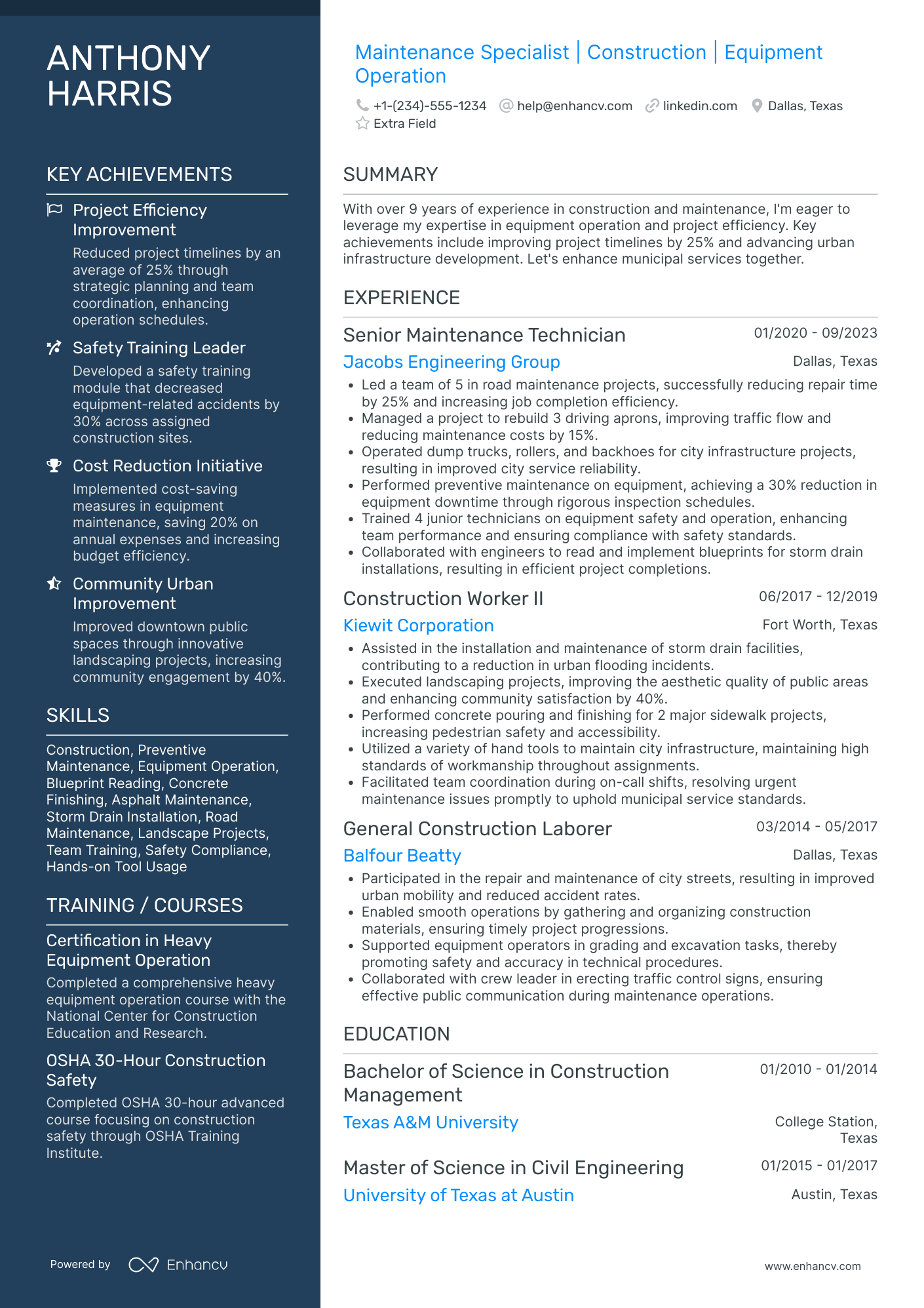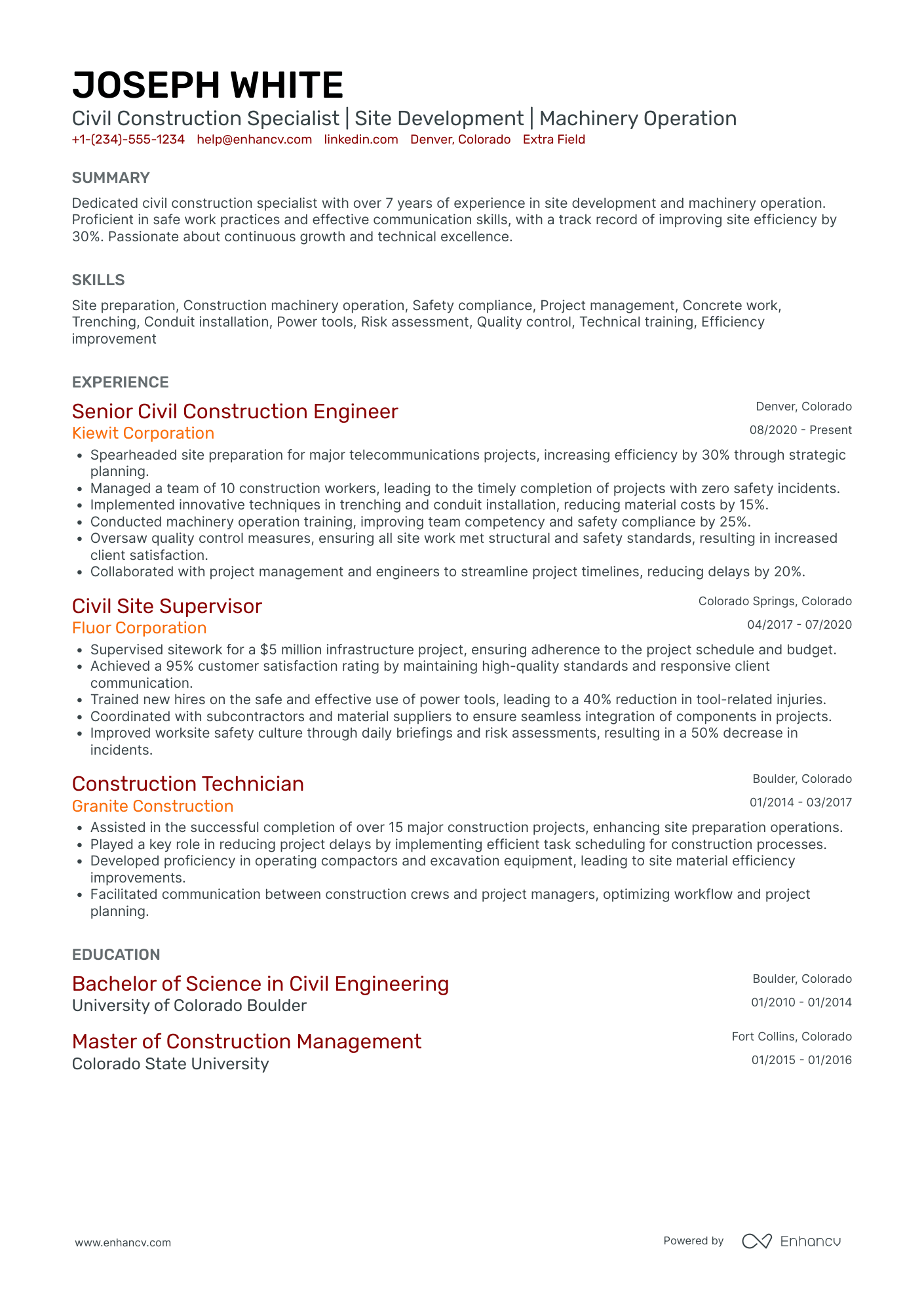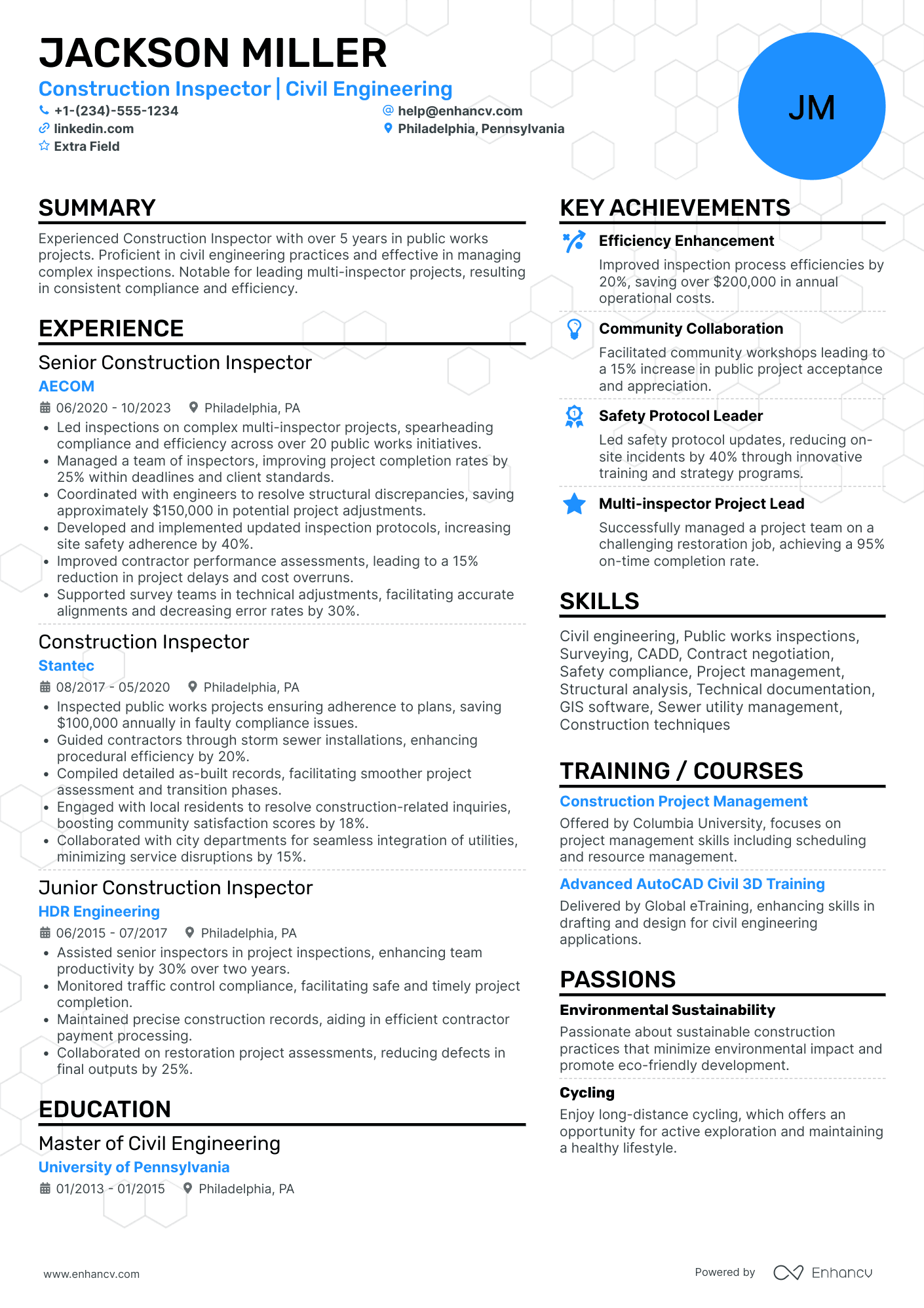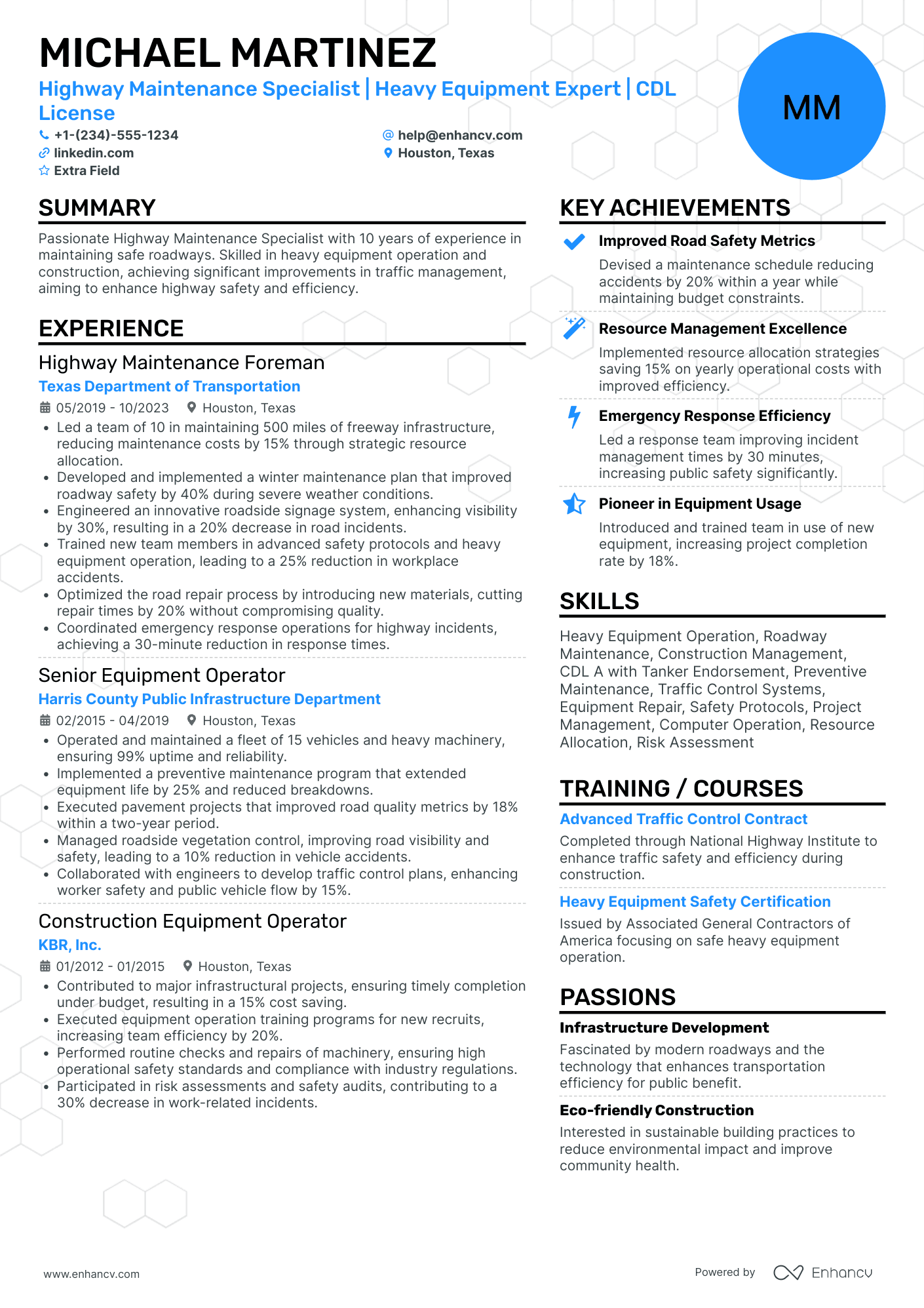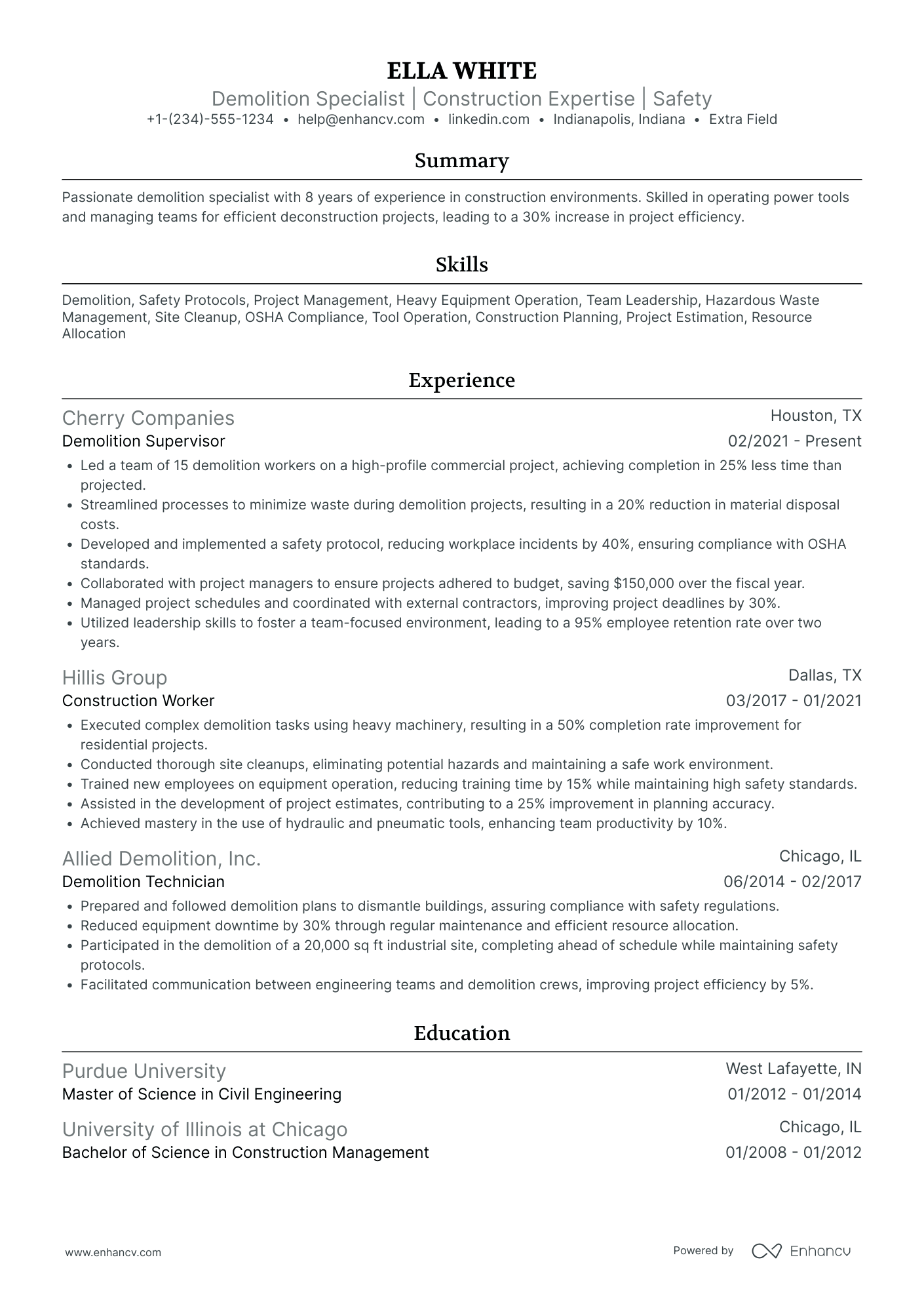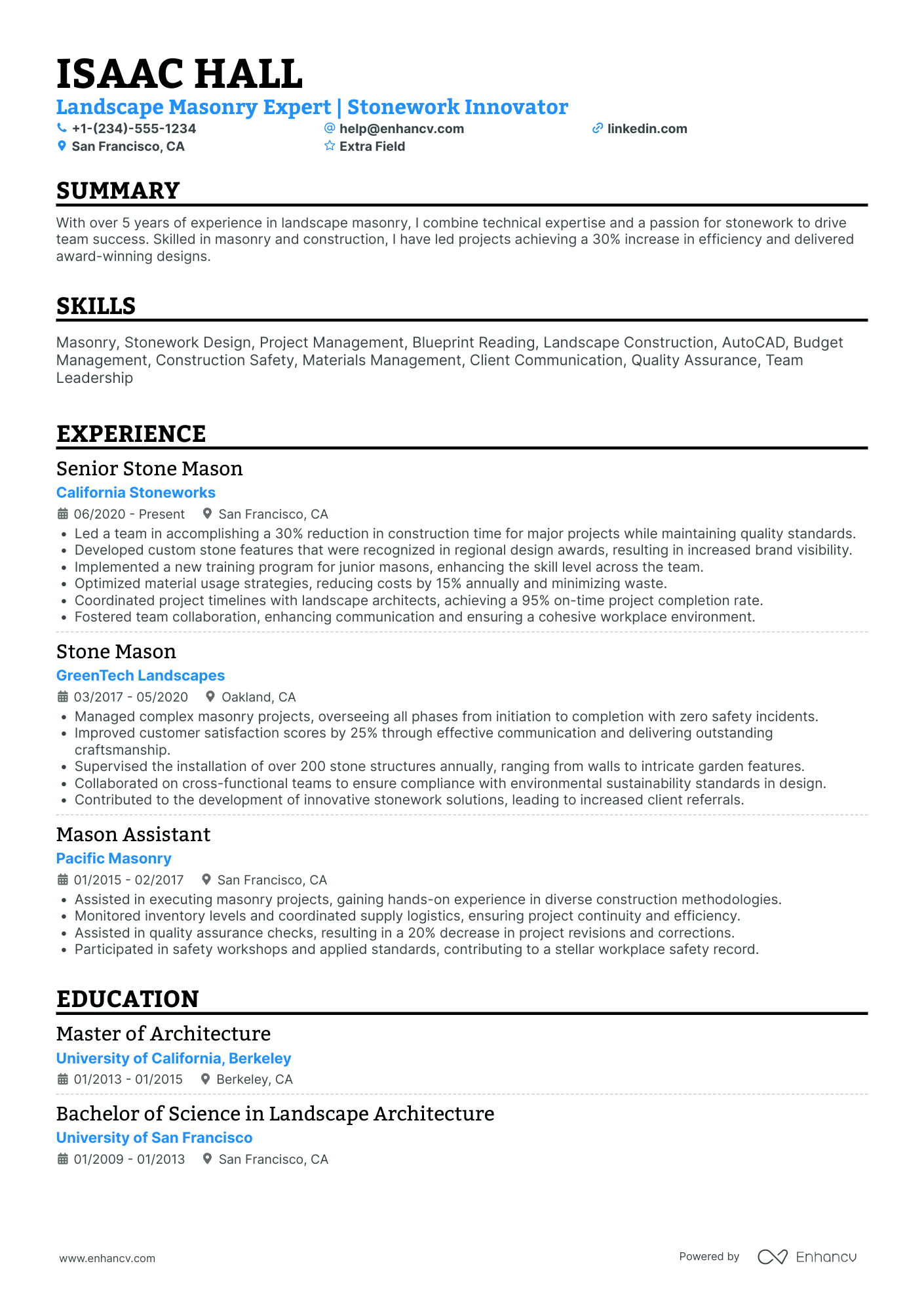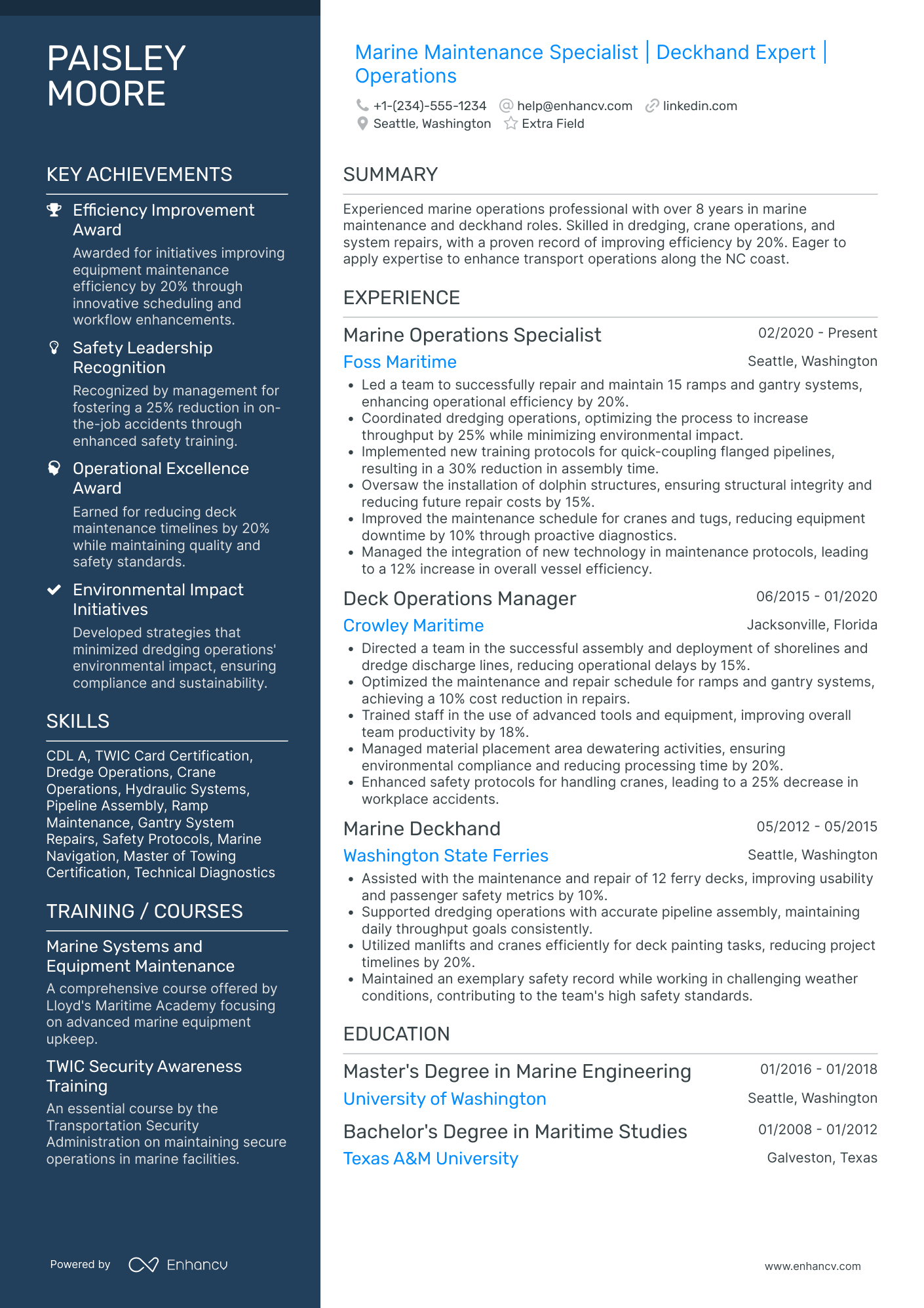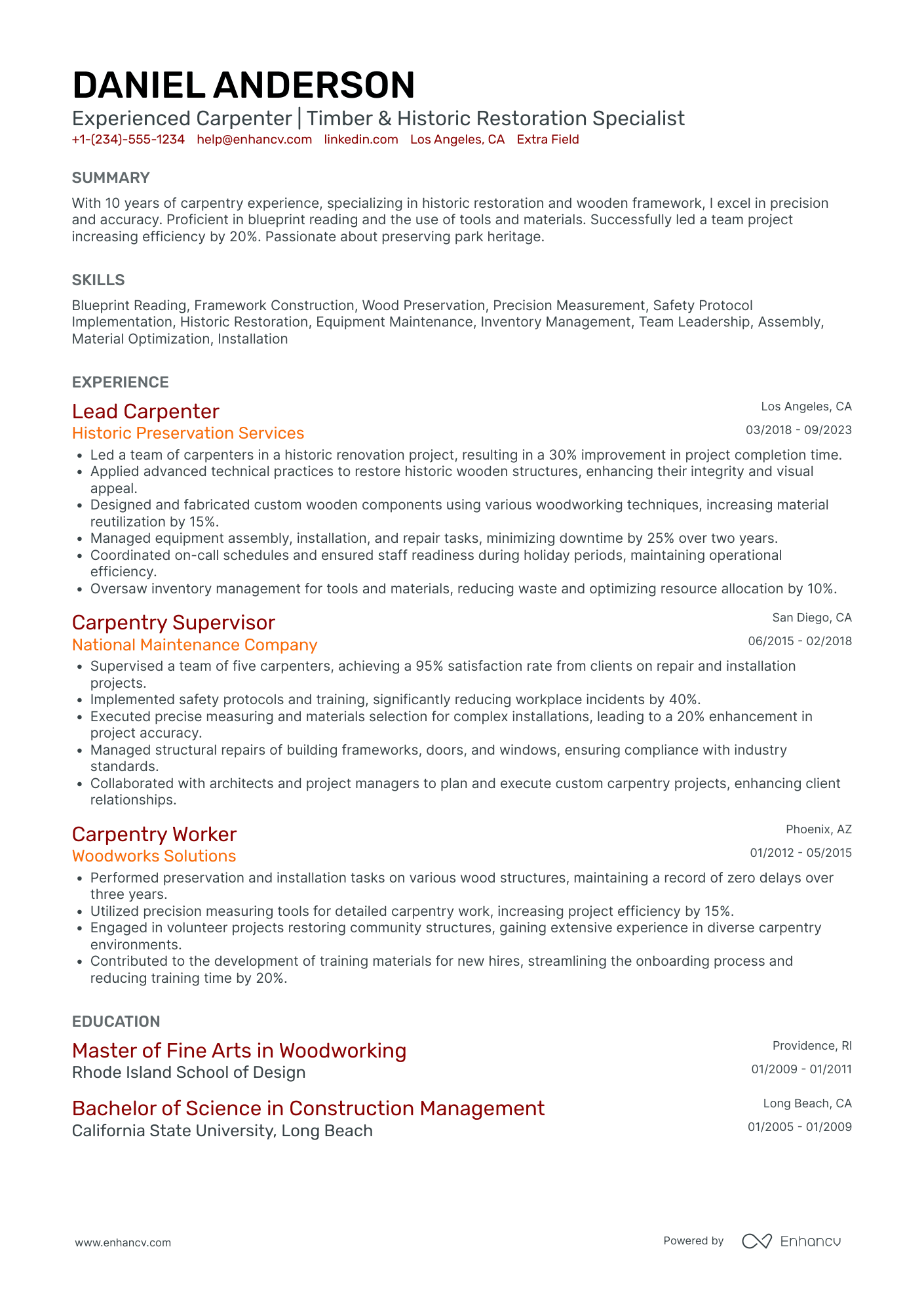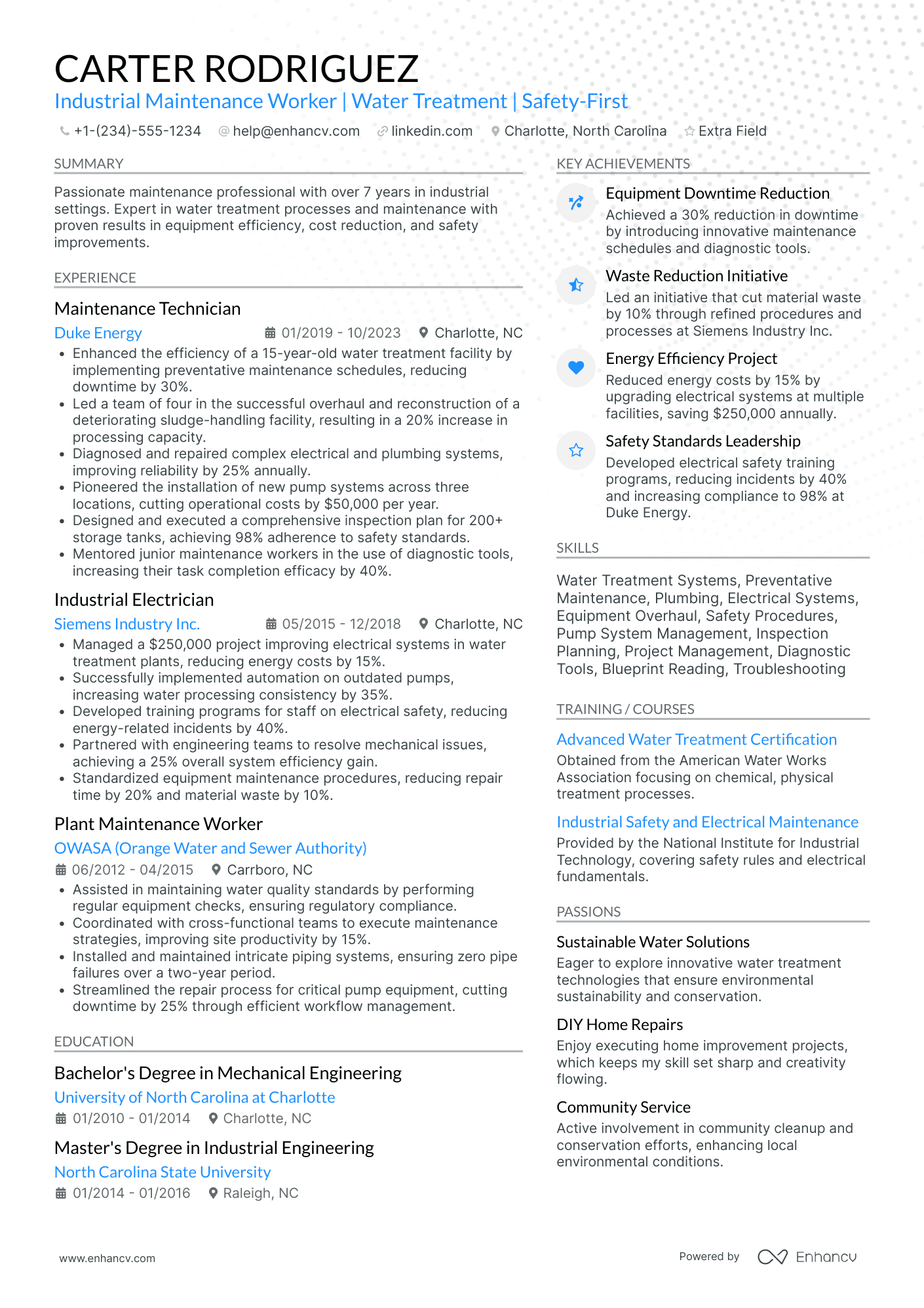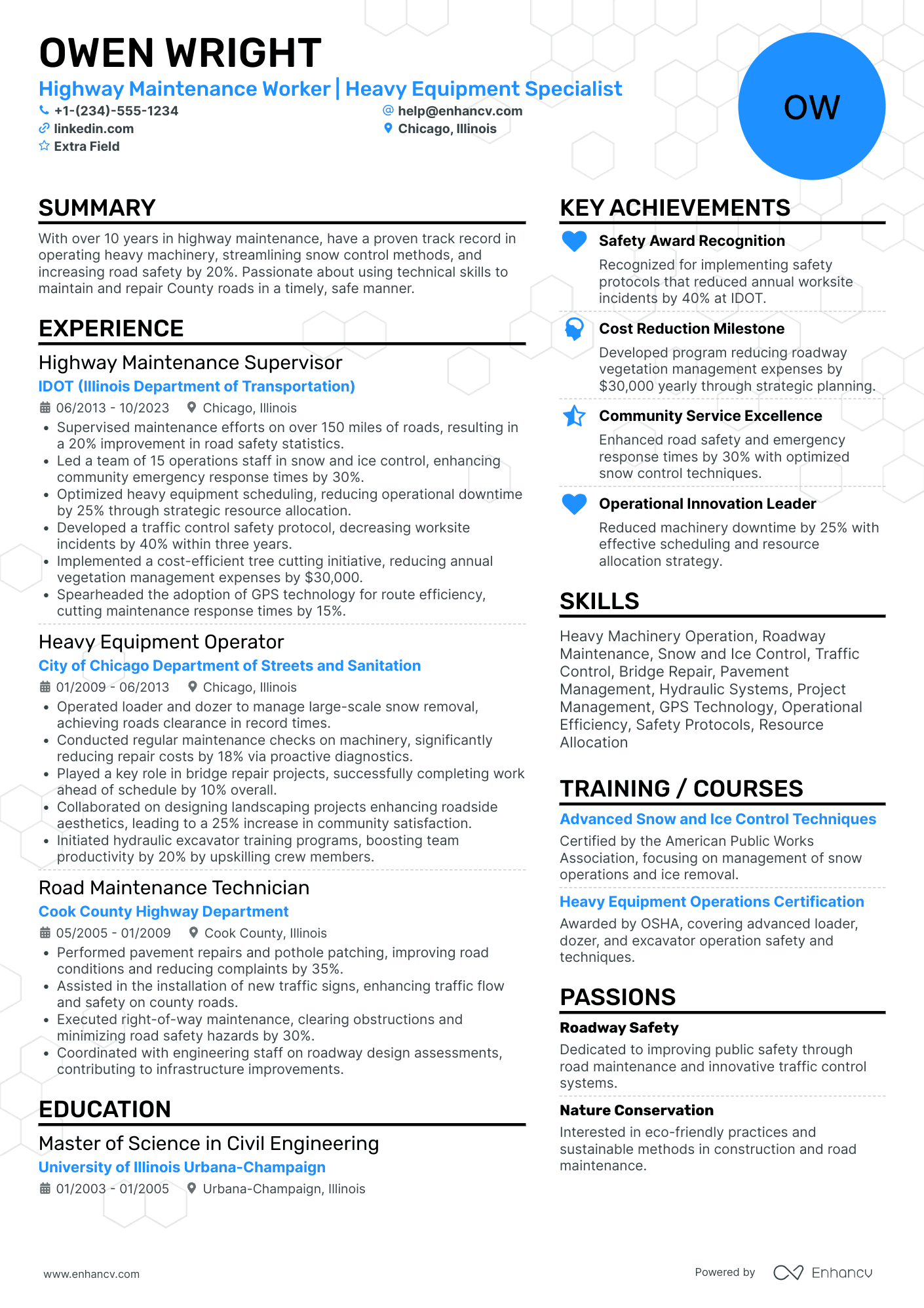Proficient laborers in construction are now in high demand, which is great news if you're looking for a job in the field. Contrary to some perceptions, you can’t do construction without specific qualifications. If you're serious about it, you need to recognize it’s not just about physical strength. Construction requires specific skills. Think teamwork, problem-solving, and extensive knowledge of safety practices.
A polished construction worker resume can reveal your strengths, and land you the job, of course! Read our comprehensive guide to learn how to lay a solid foundation and build a resume that stands tall in recruiters’ minds.
Here’s an overview of what we’ll cover in this guide:
- Formatting your resume clearly and professionally
- What to emphasize depending on your experience level
- How to customize your application to a real-life construction worker job description
- What soft skills are needed in a physically demanding job
- A list of additional certifications and training that can boost your resume
- How to enhance your personal statement to grab recruiters’ attention
- Additional sections that help you show your individuality
It's now simpler than ever to learn from the best. Discover some related resume examples below:
- Electrical Project Manager Resume Example
- Architectural Project Manager Resume Example
- Construction Manager Resume Example
- Director of Engineering Resume Example
- Geotechnical Engineering Resume Example
- Automotive Engineering Resume Example
- Engineering Project Manager Resume Example
- Engineering Program Manager Resume Example
- Energy Manager Resume Example
- Electrical Manager Resume Example
Let’s begin our guide with tips on proper formatting.
How to format a construction worker resume
Every building needs a strong foundation. Similarly, your construction worker resume format is your failure-proof structure. The format you choose depends on your experience and your goals. Let’s look at the most popular formats. A reverse chronological resume is great if you have lots of experience you want to showcase. It lists your workplaces starting with the most recent one. This gives recruiters a comprehensive overview of your career history. Consider the functional resume if you don’t have that much experience and instead want to focus on your skills and accomplishments. It’s also a suitable choice if you’re considering switching careers. And finally, we have the hybrid resume. It’s best if you want to put equal emphasis on your experience and skills. Here are some additional tips:
- Resume layout: Use standard 1-inch margins to ensure your resume is easy to read. Consider using a 2-column layout to maximize space. Bullet points can effectively show your skills and construction work experience.
- Colors: Utilize a subtle color palette to make your resume stand out without appearing unprofessional.
- Clear header: This key section should be placed at the top of your resume. Include your contact info, such as full name, phone number, and email address at the top of your resume. Having a physical address is also a big plus. Construction work typically requires you to be on-site. Generally, a construction worker job posting would rarely require a photo. Do follow the position’s specifications, though.
- Fonts: Opt for clean, professional fonts such as Rubik, Calibri, or Lato. Maintain consistent font sizes: 10–12 points for body text and a slightly larger size for headers.
- Resume length: Usually, a 1-page resume is enough to fit your experience and skills. A 2-page resume is also acceptable if you’ve got more than 5 years of construction work or related experience.
- File format: Save your resume as a PDF file to maintain its formatting. Its readability by ATS screening is no problem.
The layout of a resume can differ by region – Canadian resumes may use a distinct format.
Already have a resume? Try our free resume checker to ensure a top-notch application!
Is your resume good enough?
Drop your resume here or choose a file. PDF & DOCX only. Max 2MB file size.
Consider adding the following sections to your resume for a thorough application.
The top sections on a construction resume:
Skills and certifications: This section is essential as it highlights the necessary skills and training related to construction work. Include certifications such as safety training or specialized equipment operation.
Employment history: This part of the resume provides recruiters with a transparent record of your previous construction work experiences. It also describes the responsibilities and contributions for each job.
Project highlights: In the competitive construction industry, showing your capacity through examples of previous projects can distinguish your application. This section should highlight the types of projects you've worked on, emphasizing your unique value.
Education and training: While formal education may not be paramount in every construction role, specialized training and courses could be valuable. So, include details of any relevant studies in this section.
References: While not a requirement, having references could solidify your credibility, especially if they come from reputable figures within the construction industry. This section could potentially give you an edge over other candidates.
Everyone knows recruiters look for some key things on your resume. Here’s a list to keep in handy:
What recruiters want to see on your resume:
- Physical skills and strength: It’s important for a construction worker to have physical fitness and strength. Construction work often involves lifting heavy materials, operating machinery, and other strenuous tasks.
- Experience with tools and machinery: Knowing how to use various tools and machinery is critical in the construction sector. Recruiters often look for candidates with a wide range of expertise in this area.
- Safety knowledge and practices: Safety can't be overstated in the construction field. Recruiters pay attention to candidates who show a clear understanding and adherence to safety protocols.
- Adaptability and problem-solving skills: Unforeseen issues often arise in construction projects. Recruiters prioritize candidates who have proven their ability to adjust to changing conditions and solve problems efficiently.
- Communication skills: Though it may seem less relevant, good communication skills are vital in construction work. These help coordinate with teammates and understand detailed instructions accurately. Recruiters value this skill highly when selecting candidates.
How to write your construction worker resume experience
If the format is the foundation of your resume, the experience entries are its building blocks. Think about which experiences are best aligned with the position you’re applying for. Think twice before including positions you held over 15 years ago. These might not be relevant to the current job market. And a word of caution for entries not directly related to the job posting. If you can tailor those to the specific job you’re coveting, that’s great. Using specific keywords from the job posting improves your resume’s outcome on ATS (Applicant Tracking Systems). Just keep in mind irrelevant experience just takes up valuable space.
So your construction worker experience section should be clear and relevant. How about an example? Let’s look at this real job posting.
Job title: Log Construction Worker
Company introduction: We are looking for a log timber worker to join our team!
Are you a self-motivated, hard worker with a passion for log construction? Our company is seeking a dedicated individual to fill the role of Log Construction Laborer in Gypsum, CO. As a key member of our team, you will be responsible for assisting with the construction of high-quality log structures in a fast-paced environment.
Job description: In this role, you will be expected to take initiative and demonstrate a strong work ethic. You should be able to work well both independently and as part of a team, following directions and completing tasks in a timely and efficient manner. Attention to detail and a commitment to quality are essential qualities for success in this role.
The ideal candidate for this position isn’t afraid to roll up their sleeves and tackle any task that comes their way. You should be physically fit and able to perform the duties required of a log construction laborer, including moving heavy logs, using power tools, & working in various weather conditions. A positive attitude and a willingness to learn are also important qualities we are looking for in a candidate.
Requirements:
Production
- Following a bid & plans to fabricate & install log structures
- Controlling costs and supporting crew lead to completing jobs at or under quoted hours
- Fabricating and installing rail, deck, and, log structures
- Maintaining site & yard organization throughout the workday
- Follow outlined job processes to complete jobs according to company standard
- Learn about tools & log products for their correct use and/or application
- Organize and produce work on the job site in cooperation with co-workers
- Layout job in an efficient manner based on bid
Self-Management
- Add to a positive work culture
- Regulate yourself and exemplify company values/culture
- Maintain an understanding of the crew’s current projects and workload
- Be professional and develop professionalism in others
- Communication is key - fix any breakdowns in communication between parties
- Stay engaged and involved in the projects
Data Analysis, & Office Processes
- Assess completed job report actual numbers against job estimates. Identify potential reasons for failure/success in various sections.
- Answer phone calls, emails, and voicemail daily
- Adhere to company procedures and policies
- Complete non-production job tasks accurately and on time
Client Interfacing
- Interact with clients to ensure their satisfaction
- Reinforce site conditions so clients understand we value their space
- Taking site photos before, during, and after jobs to provide a unified understanding of the site.
Qualifications:
- Some Carpentry Experience (preferred)
- Bilingual (English Required, Spanish Preferred)
- Ability to read blueprints (preferred)
- Clean driving record (required)
- Reliable vehicle (required)
- Climb ladders & work from heights (required)
- Work onsite or in a yard (required)
- References (required)
Location: Vail, CO
We all learn best from our mistakes, so here’s a bad example:
- •Assisted in the setup and cleanup of construction sites
- •Transported materials and equipment to job sites
- •Helped with the installation of various construction materials
- •Ensured compliance with safety regulations
- •Maintained tools and equipment
The entry won’t get ahead because of:
- Lack of specialized skills: The entry lists tasks that are too general. They don’t demonstrate specific skills relevant to log construction, such as using specialized tools.
- Insufficient demonstration of key qualities: The experience doesn’t highlight important qualities like attention to detail, initiative, or physical fitness. And these are crucial to the job posting.
- No client interaction or data analysis: The section lacks mention of any interaction with clients or data analysis tasks, which are part of the job description.
Here’s an example that’s more to the point:
- •Proactively identified and resolved potential issues, ensuring smooth project progression, resulting in a 20% reduction in delays.
- •Maintained excellent relationships with clients, consistently receiving positive feedback with a 95% satisfaction rate.
- •Demonstrated leadership by training 15 new hires, improving team efficiency by 30%.
This entry includes the right keywords the job poster seeks, such as:
- Proactive problem solving: Identifying and resolving issues before they escalate ensures project continuity and efficiency.
- Positive client relationships: Good client interactions foster trust and satisfaction, leading to repeat business and positive referrals.
- Quantifiable achievements: Showcasing concrete metrics like reducing project delays by 20%, achieving a 95% client satisfaction rate, and improving team efficiency by 30% will get you ahead with every recruiter.
What if you have some freelance experience? Many construction workers do. Keeping it clear and concise, include it in your resume. And don’t forget to add satisfied clients as references—it’s a great way to up your value as a potential employee.
How to quantify impact on your resume
Numbers and metrics grab recruiters’ attention and give a quick glimpse into your specific achievements. Quantify your success and the effect it had on the organization or the team you worked with. Here are some ideas:
- Include the number of safety training and certifications completed: Keeping safety a priority shows you're responsible and committed to protective procedures.
- Indicate the percentage by which you helped reduce mishaps or accidents on the job: This displays your active contribution to creating a safer environment. It’s also a strong selling point in a risky field like construction.
- Detail the quantity of customer complaints resolved: If you were in a role that interacted with clients, highlighting your problem-solving skills. This shows a business-first mindset.
- Mention the number of construction projects completed on time: This shows recruiters you respect deadlines and have good time management skills.
- Display the percentage by which you helped increase efficiency in a process or task: Prove you can streamline methods and improve productivity.
- List the number of material loss incidents you prevented: Vigilance and an ability to manage resources are appreciated in the construction sector.
- Point out the improvement in worker retention under your supervision: If you had leadership roles, showing you successfully ran a stable team demonstrates your management skills.
- Note the amount or percentage saved through your cost-effective measures: This exemplifies your financial savviness. It underlines your ability to work while considering company's budget constraints.
But what about when you have no experience? Or just a little? Don’t worry, you can still get a job, just follow our advice.
How do I write a construction resume with no experience
So what if you have limited or no experience? Construction workers are more and more in demand, as the workforce encounters an employment shortage. Use that to your advantage. Make up for your lack of experience with dedication and eagerness to learn. A good idea to consider is taking an apprenticeship in your desired field. Look for local organizations providing similar opportunities. An apprenticeship is a great way to get started if you have no previous experience. Rely on professionals to teach you everything you need to know.
Here are some main points to focus on:
- Education: A high school diploma or GED meets the basic educational requirement for most construction jobs.
- Physical fitness: Ensure good physical health and stamina. It’ll help you handle the physically demanding nature of construction work. You can add any sports in the hobbies and interests section of your resume.
- Safety training: Complete a safety certification to understand safety practices and regulations.
- Certifications: Get necessary trade certifications relevant to your specific field (e.g., plumbing, electrical). Ensure you have a valid driver’s license for job site travel.
- Job search: Use job boards, networking, and local trade organizations to discover job opportunities. It’s also a way to connect with industry professionals.
- Basic skills: Develop basic math skills for measurements and calculations. Look up common construction tools and equipment.
- Soft skills: Cultivate effective communication, problem-solving abilities, and attention to detail. This is a classic recipe for better teamwork and job performance.
Your skills are an integral part of your construction resume. Read on to find out why and how to describe them.
Construction worker skills on a resume
Hard skills are the bread and butter of construction work. These are practical assets that will help with the essence of the job. Hard skills can vary between knowledge of specific construction software or reading blueprints. They can also be easily quantified via your education, certificates, and on-the-job success.
Here’s a list of the best practical capabilities for your construction resume:
Best hard skills for your construction worker resume
- Masonry skills
- Carpentry abilities
- Expertise in plumbing
- Proficiency in electrical repairs
- Knowledge of welding techniques
- Skilled in concrete work
- Expertise in installing drywall
- Proficiency in operating heavy machinery
- Capabilities in painting and decoration
- Ability to read blueprints
- Knowledge of heating, ventilation, and air conditioning systems
- Tiling abilities
- Proficiency in using power tools
- Roofing skills
- Flooring installation capabilities
- Ability to use construction software
- Knowledge of building codes
- Skills in using laser levels
- Familiarity with scaffolding setup
- Capabilities in bricklaying
As for soft skills, they’re just as important for construction workers. You’ll most likely work in a team, so any people skills you’ve got will be of use. These could include your ability to communicate, adapt, and grow in new environments. These skills can be more difficult to measure, so rely on specific examples. Think of a situation where you had to use your patience and negotiation skills to work with someone. What did you gain from this experience? How would you apply it in the future?
Best soft skills for your construction worker resume
- Teamwork
- Communication
- Leadership
- Problem-solving
- Time management
- Adaptability
- Customer service
- Attention to detail
- Motivation
- Active listening
- Patience
- Ability to work under pressure
- Decision-making
- Confidence
- Negotiation
- Optimism
- Planning and organization
- Conflict resolution
- Resilience
- Initiative
PRO TIP
Steer clear from overly used skills entries such as MS Office, unless they’re specifically mentioned in the job posting.
One way to show your skill set is through your education section. Let’s see how it’s done.
How to list your certifications and education on your resume
In some cases, a high school diploma or a GED diploma can be enough for your construction resume. However, higher education is always a major asset. It shows commitment and hard work, so if you have it, list it properly. The focus should be on the relevant knowledge you’ve obtained. Any projects or achievements that can help you with construction work will also benefit your application. Your degree can range from anything from construction management and civil engineering to real estate development or occupational health and safety. Just make sure you emphasize its strong points.
Let’s explore this education entry:
- •Dean’s List for multiple semesters.
- •Relevant coursework: Building Codes and Standards, Construction Materials, Project Management.
- •Completed a capstone project involving the construction of a small residential building, managing a team of five peers.
- •Participated in a summer internship with XYZ Construction Company, gaining hands-on experience in site preparation, framing, and finishing.
Here’s why it works:
- Degree and institution: The entry specifies an "Associate of Applied Science in Construction Technology" from a Technical Community College. This is highly relevant for a construction worker role. The educational background aligns with the industry and demonstrates specialized training.
- Date range: A timeline from 2018 to 2020 shows recent and relevant education. The candidate’s knowledge is up-to-date with current construction practices and technologies.
- Capstone project: A capstone project involving the construction of a residential building demonstrates practical experience. Additionally, highlighting team management showcases your leadership skills.
Training and certifications prove a serious approach to your career. These credentials can provide specialized skills and knowledge. Going beyond the basic requirements makes you a more attractive candidate to employers.
For a construction worker, this might include certifications in safety protocols or equipment operation and specific construction techniques. Additional training shows you're willing to invest in yourself. Plus, it's a great way to stay updated with industry standards. Being proactive about learning new skills is always appreciated by employers.
Practical experience is invaluable in a field that relies heavily on hands-on work. This can come from both on-the-job training and internships. It allows you to apply theoretical knowledge in real-world settings. Some nuances of construction work that cannot be taught in a classroom, so make sure you get out there.
Here’s a list of the best construction worker certifications you can obtain:
Best certifications for your construction resume
Before any recruiter dives into your specific knowledge, they’ll want to see your vision for yourself and your career. These are best displayed in your personal statement.
How to write your construction worker resume summary or objective
A personal statement shows recruiters what you’re all about. Place it beneath your header for a brief recap of your goals and aspirations. A professional summary and objective should be tailored to the job posting. Use keywords from the description to easily pass the ATS screening.
If you have some experience already, opt for the construction resume summary. It's usually 3–5 sentences long and contains a quick overview of your work history and achievements. Focus on how you can contribute to the business. Use industry-specific language to better align with the job posting.
The resume objective is best for those who are just starting out or are making a career transition. It should be about 3 sentences long and hook the reader instantly. Here’s what you can include in yours.
Take a look at a bad resume summary:
This won’t impress recruiters for a few reasons:
- Focuses on personal benefits: Emphasizes what the candidate wants rather than what they can offer to the employer.
- Minimal skill highlight: Mentions a vague experience with tools. The commitment to continuous improvement doesn't detail specific skills or qualifications.
- No mention of career goals: Doesn’t address long-term career goals or how the candidate intends to grow within the company. This is important as employers look for committed and career-oriented employees.
And here’s the improved version:
You can see why this is much better:
- Measurable experience: Provides specific, measurable achievements such as leading a team of 10 and increasing project efficiency by 15%, giving a clear indication of the candidate's impact and capabilities.
- Safety commitment: The candidate mentions a commitment to maintaining high safety standards, crucial in the construction industry and indicative of responsibility and awareness of industry protocols.
- Growth and success orientation: The summary shows eagerness to contribute to the company's success. It’s clear the candidate is interested in positively impacting the company and willing to go beyond basic job duties.
Finally, take a look at our suggestions for additional sections to add to your construction resume. These can truly make your application one of a kind.
Optimize your resume summary and objective for ATS
Drop your resume here or choose a file.
PDF & DOCX only. Max 2MB file size.
Additional sections for a construction worker resume
They aren’t compulsory but prove to be very effective when applying for that dream job. Even if you think you’ve got everything you need, go the extra mile by adding one of these additional sections to your resume:
- Projects: Make a detailed list of significant projects you’ve worked on. Include the scope, duration, location, role, and specific contributions. This shows hands-on experience and the ability to handle different types of construction work.
- Volunteer work: Highlight any volunteer work related to construction, such as building homes for Habitat for Humanity. This demonstrates a commitment to giving back and community involvement.
- Languages: Include any additional languages spoken. Bilingual or multilingual laborers are appreciated in diverse work environments. It also eases communication with a wider range of clients and team members.
- Continuing education: Mention any ongoing education efforts, such as workshops, seminars, or online courses. It’s best if they’re related to construction, new technologies, or safety practices. This shows a commitment to learning and professional development.
- Hobbies and interests: Here’s the place to brag about that DIY project you’ve been working on in the garage.
- Safety record: Detail your safety record. This can feature adherence to safety protocols or roles as a safety officer or coordinator.
Professional affiliations on a construction worker resume
This section could enhance the professional tone of your construction resume. Include memberships in professional organizations related to construction. This shows commitment to the industry and staying updated with trends and standards.
Here’s what it could look like:
- •Participated in training programs for heavy equipment operation
- •Contributed to union meetings and activities
- •Achieved certification in advanced construction safety
- •Engaged in continuous professional development workshops
Key takeaways
We’ve covered everything you need to know to succeed when applying for a construction worker job. But just in case you need a quick review of what we’ve talked about so far, here’s a recap:
- Formatting: Keep your resume clean, professional, and easy to read. Use bullet points and consistent formatting.
- Listing experience: Highlight hands-on construction experience. Detail specific projects, roles, outcomes, and specialized tasks like operating heavy machinery.
- Applying with no experience: Emphasize related skills, volunteer work, transferable skills (e.g., physical stamina, teamwork), and any internships or on-the-job training.
- Education and certifications: Include relevant education, such as high school diplomas or degrees in construction management, and trade-specific credentials.
- Hard and soft skills: Combine technical skills (e.g., blueprint reading, plumbing) with soft skills (e.g., communication, leadership) to show balanced competence.
- Resume summary or objective: Write a concise professional construction worker summary or objective. Make sure it’s tailored to each job, and reflects your experience and career goals.
- Additional sections: Add sections for relevant volunteer work or special recognitions to stand out from other candidates.
Construction Worker resume examples
By Experience
Construction Worker Supervisor
Lead Construction Worker
Construction Worker Trainee
Senior Construction Worker
Skilled Construction Worker
Unskilled Construction Worker
Certified Construction Worker
By Role
